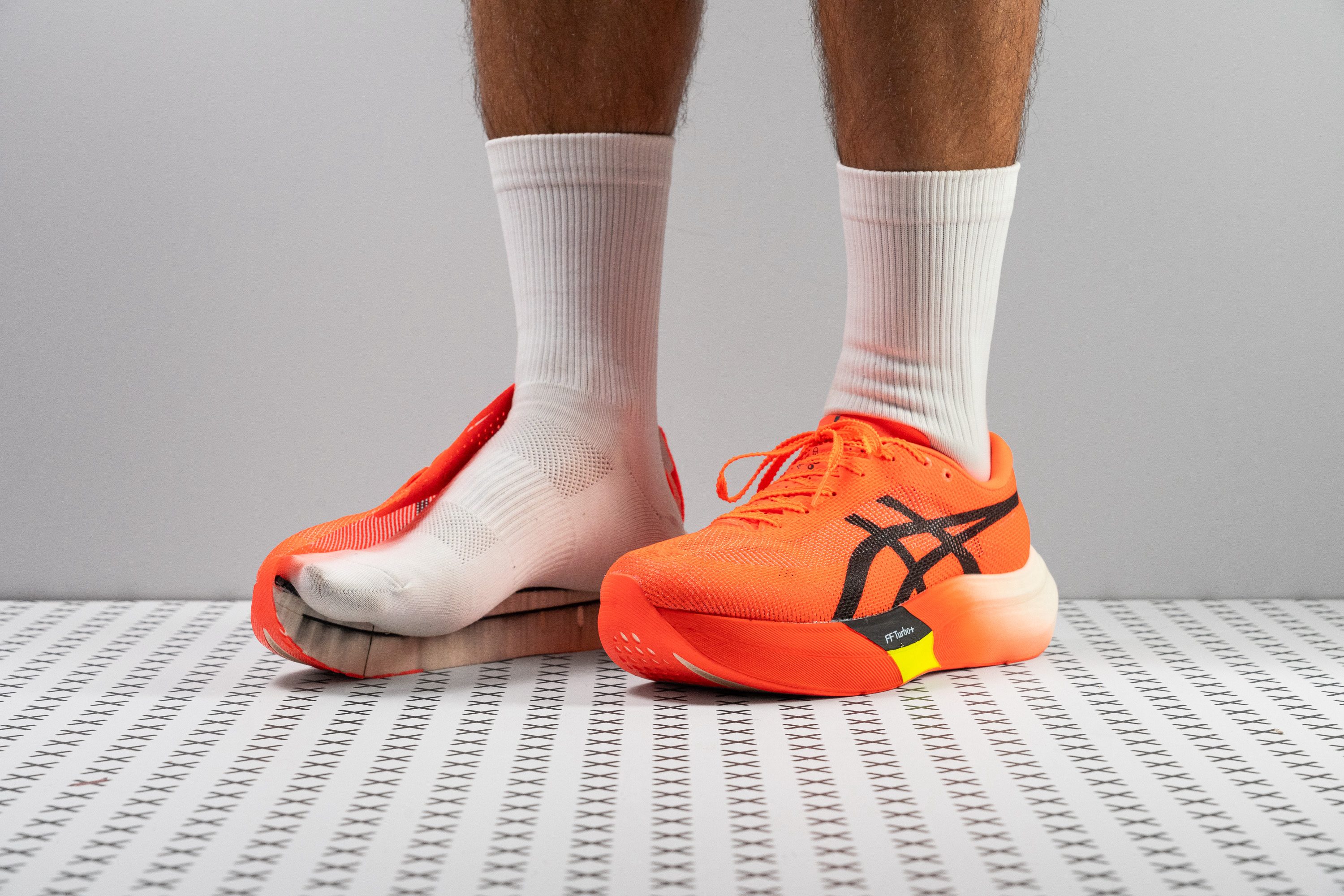Our verdict
Pros
- Exceptionally lightweight design
- World-class energy return
- Versatile for distances from 5K to marathon
- All-weather grippy outsole
- Redesigned, improved upper
- Incredibly cushioned
- Perfect for midfoot and forefoot strikers
- Fantastic durability
Cons
- Not suitable for heel strikers
- Less stable than Sky+
Audience verdict
- Top 21% in road running shoes
- Top 30% in ASICS running shoes
Comparison
The most similar running shoes compared
+ + Add a shoe | |||||
|---|---|---|---|---|---|
| Audience score | 90 Superb! | 90 Superb! | 80 Good! | 88 Great! | |
| Price | $250 | $230 | $250 | $285 | |
| Pace | Competition | CompetitionTempo | Competition | Competition | |
| Shock absorption | High | High | High | High | |
| Energy return | High | High | High | High | |
| Traction | High | High | High | Moderate | |
| Arch support | Neutral | Neutral | Neutral | Neutral | |
| Weight lab Weight brand | 6.5 oz / 183g 6.4 oz / 181g | 7.2 oz / 204g 7.4 oz / 209g | 9.1 oz / 257g 8.2 oz / 232g | 7.1 oz / 201g 7 oz / 198g | |
| Lightweight | ✓ | ✓ | ✗ | ✓ | |
| Drop lab Drop brand | 6.5 mm 5.0 mm | 10.6 mm 8.0 mm | 6.0 mm 2.0 mm | 8.5 mm 8.0 mm | |
| Strike pattern | Mid/forefoot | Heel | Mid/forefoot | HeelMid/forefoot | |
| Size | Slightly small | True to size | True to size | Slightly small | |
| Midsole softness | Balanced | Soft | Balanced | Soft | |
| Difference in midsole softness in cold | Small | Normal | Small | Small | |
| Toebox durability | Good | Bad | Decent | Bad | |
| Heel padding durability | Good | Good | Decent | Good | |
| Outsole durability | Good | Decent | Bad | Bad | |
| Breathability | Breathable | Moderate | Breathable | Breathable | |
| Width / fit | Narrow | Medium | Medium | Medium | |
| Toebox width | Medium | Narrow | Medium | Medium | |
| Stiffness | Stiff | Stiff | Stiff | Stiff | |
| Torsional rigidity | Stiff | Stiff | Stiff | Stiff | |
| Heel counter stiffness | Flexible | Flexible | Flexible | Flexible | |
| Plate | Carbon plate | Carbon plate | Carbon plate | Carbon plate | |
| Rocker | ✓ | ✓ | ✓ | ✓ | |
| Heel lab Heel brand | 39.1 mm 39.5 mm | 39.2 mm 40.0 mm | 37.9 mm 39.5 mm | 38.1 mm 40.0 mm | |
| Forefoot lab Forefoot brand | 32.6 mm 34.5 mm | 28.6 mm 32.0 mm | 31.9 mm 37.5 mm | 29.6 mm 32.0 mm | |
| Widths available | NormalWide | Normal | Normal | Normal | |
| Orthotic friendly | ✓ | ✓ | ✓ | ✗ | |
| Season | SummerAll seasons | All seasons | SummerAll seasons | SummerAll seasons | |
| Removable insole | ✓ | ✓ | ✓ | ✗ | |
| Ranking | #77 Top 21% | #40 Top 11% | #326 Bottom 14% | #133 Top 35% | |
| Popularity | #152 Top 40% | #44 Top 12% | #302 Bottom 20% | #23 Top 7% |
Who should buy
After testing the Metaspeed Sky Paris, we are convinced that it represents a significant advancement for the series and is an excellent choice for:
- Midfoot and forefoot strikers looking for a top performer across any distance from 5K to the marathon.
- Runners who tried the previous Metaspeeds but desired more cushioning.
- ASICS aficionados who prefer the brand's training shoes and have been waiting for racing options that match the top contenders on the market—the Metaspeed Sky Paris now stands shoulder to shoulder with the best.
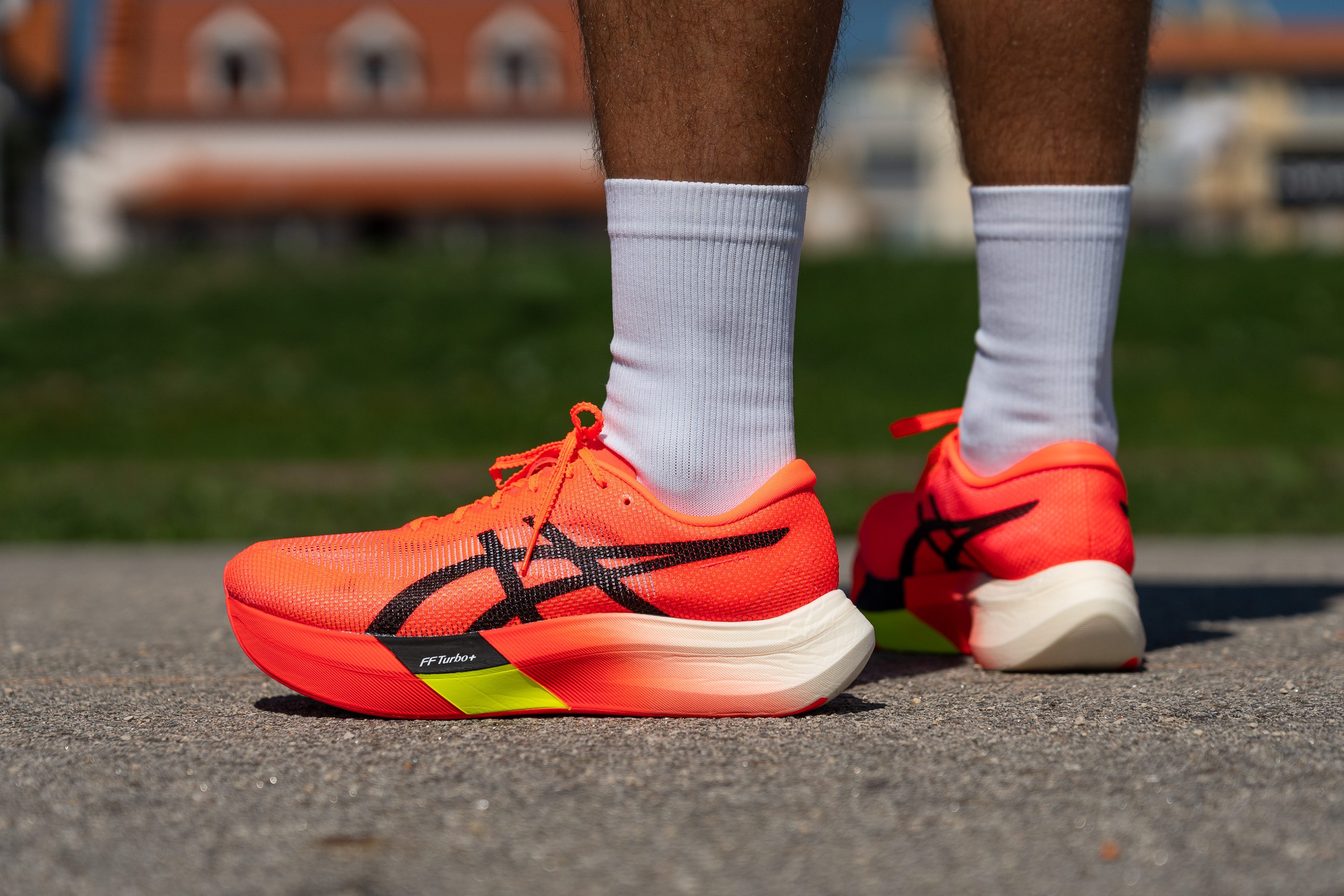
Who should NOT buy
We've rigorously evaluated the Metaspeed Sky Paris and are impressed by its performance. However, its narrow heel and moderate drop make it less suitable for heel strikers. For those needing more support, we think the Saucony Endorphin Pro 4 offers a higher drop and a more stable rearfoot.
We also believe that the Metaspeed Sky Paris may not suit runners with wider feet due to its narrow, tight upper. In our testing, the Nike Alphafly 3 and the Adidas Adizero Adios Pro 3 proved to be broader yet equally fast, offering similar performance with more room for the toes, ideal for those seeking comfort alongside speed.
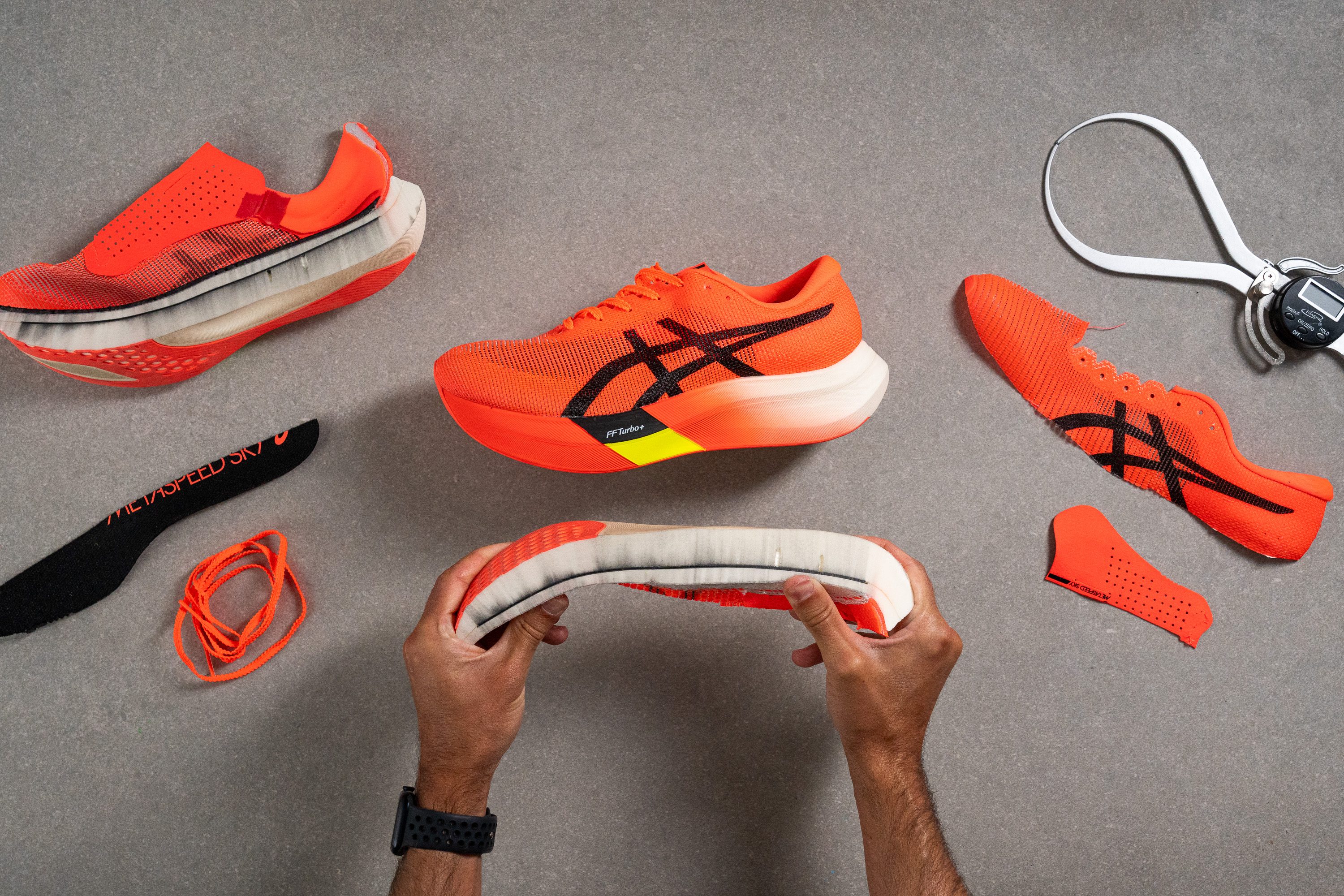
Cushioning
Shock absorption
The ASICS Metaspeed Sky Paris delivers outstanding shock absorption at the heel, scoring 137 SA helped by its sky-high stack. Up front, the forefoot also impresses with 120 SA, well above our lab average. This protective setup makes it a marathon-ideal option that easily earns our approval.
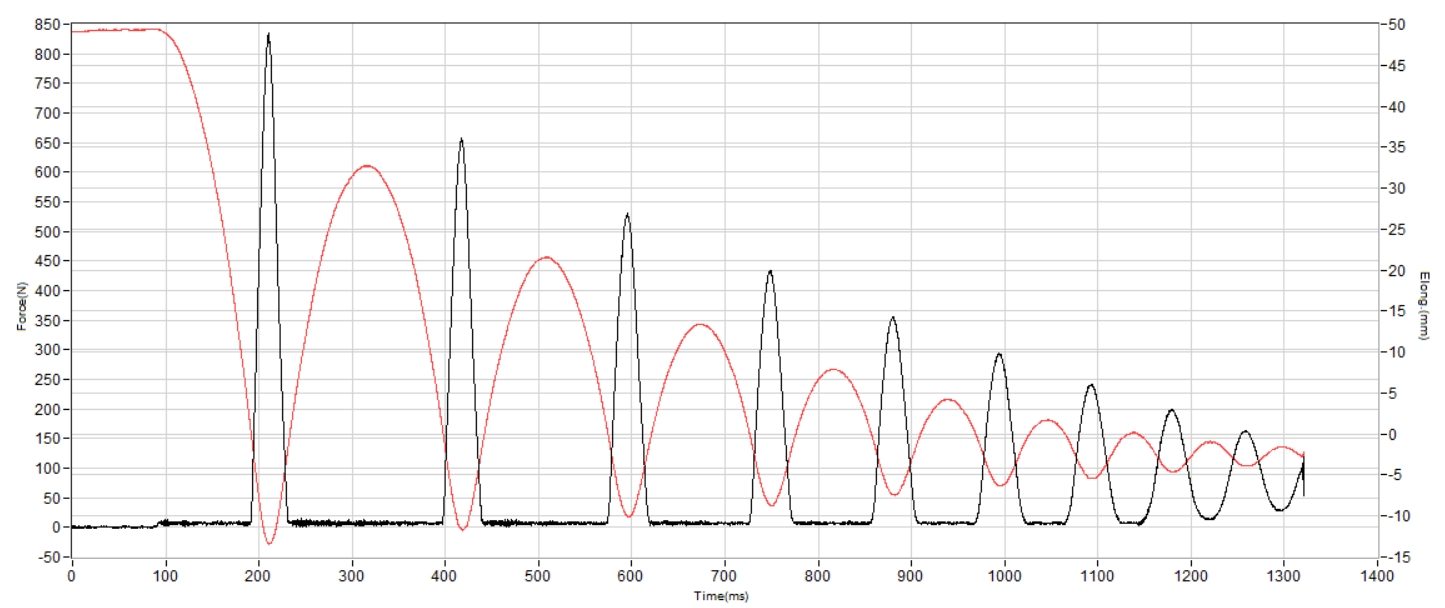
| Metaspeed Sky Paris | 137 SA |
| Average | 130 SA |
Energy return
To qualify as a true super shoe ready for any race distance, a shoe needs to deliver top-tier energy return in our ASTM F1976 test alongside solid shock absorption. The Sky Paris checks all the boxes with 73.2% of energy return in the heel and 70.7% in the forefoot.
While some super shoes exceed 75% in our lab, these numbers still place it in the upper tier.
| Metaspeed Sky Paris | 73.2% |
| Average | 58.6% |
Heel stack
The Metaspeed Sky+ was a solid performer, though we found it slightly lacking in heel cushioning (33.5 mm) for the full marathon. Luckily, we found this concern has been effectively addressed.
The Metaspeed Sky Paris, perhaps drawing inspiration from the Eiffel Tower, finally approaches the 40-mm limit set by World Athletics, boasting a colossal stack height of 39.1 mm. This is exactly what we were looking for to confidently tackle the 26.2-mile marathon distance.
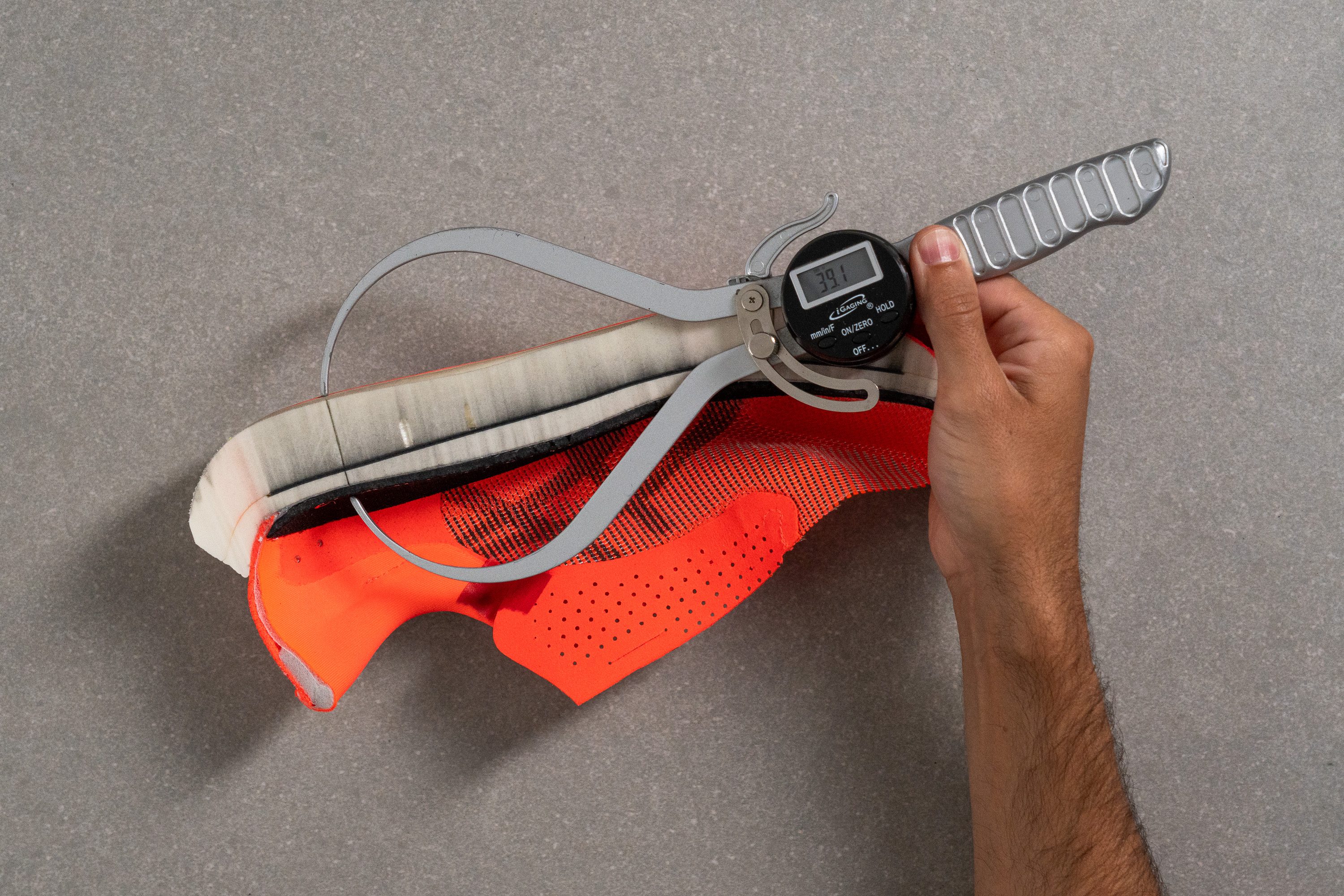
| Metaspeed Sky Paris | 39.1 mm |
| Average | 34.8 mm |
Forefoot stack
The forefoot of the Sky Paris mirrors the heel—it’s significantly higher and better cushioned than ever before. Remarkably, at 32.6 mm, it matches almost exactly the forefoot height of the Metaspeed Sky+.
This detail is crucial since the Sky Paris, in our view, is specifically designed for midfoot and forefoot strikers.
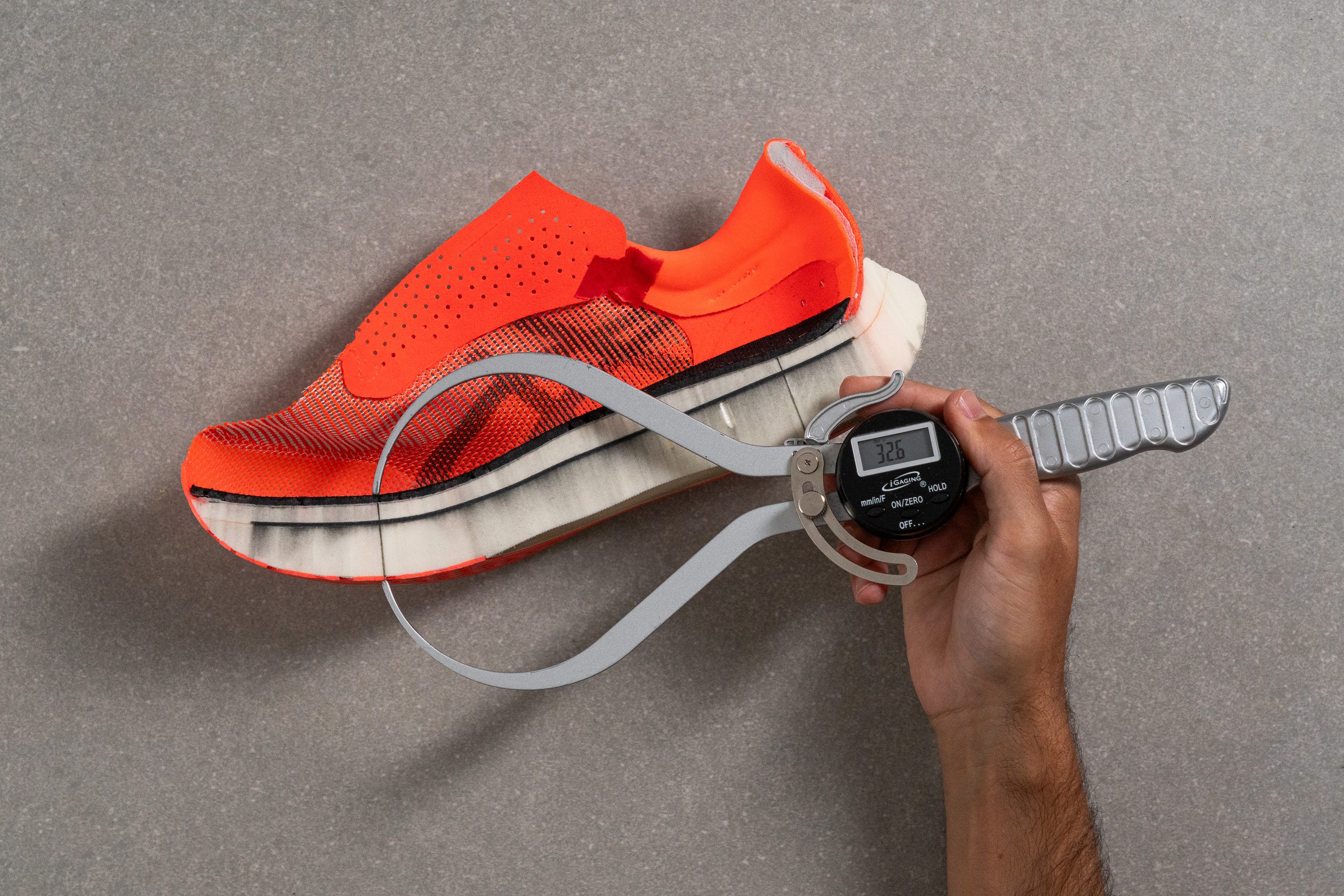
| Metaspeed Sky Paris | 32.6 mm |
| Average | 26.2 mm |
Drop
Our measurements have revealed that the Metaspeed Sky Paris features a medium heel-to-toe drop of 6.5 mm, slightly higher than ASICS' listed 5-mm drop. This still positions the shoe as an excellent option for both midfoot and forefoot strikers.
While this discrepancy may raise questions for you, we must say that our measurements align with the official guidelines set by World Athletics.
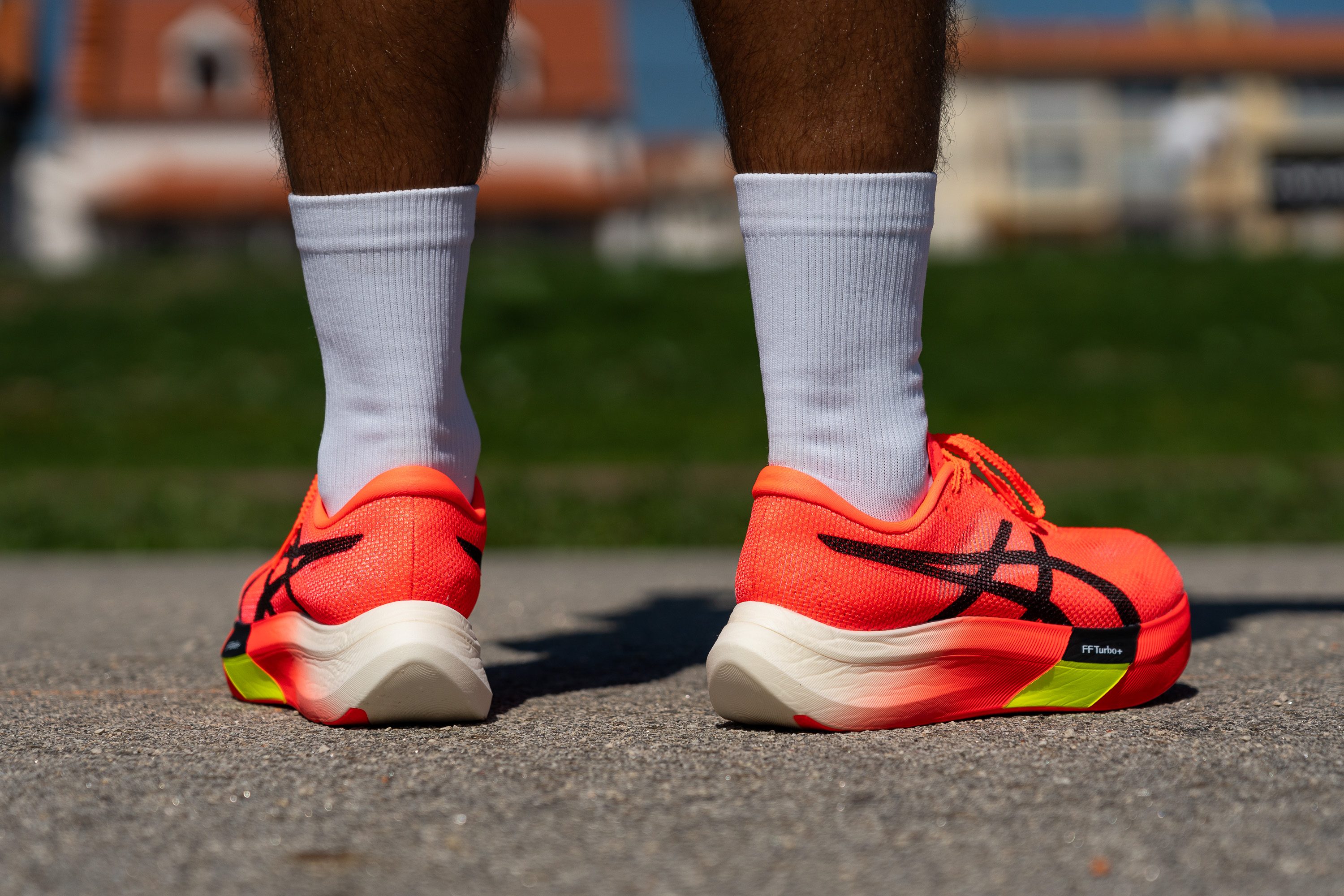
| Metaspeed Sky Paris | 6.5 mm |
| Average | 8.6 mm |
Midsole softness
We enjoyed the enhancements to both the upper and the outsole of this super shoe, yet it's the new FF Turbo+ foam that truly shines. We previously lab tested it in the Superblast 2, and we were already fans, but in the Metaspeed Sky Paris, it's amazing.
This super shoe features two distinct layers of FF Turbo+ with a carbon plate nestled between, offering one of the most responsive rides we've encountered. It simply stands out as a leading contender in energy return.
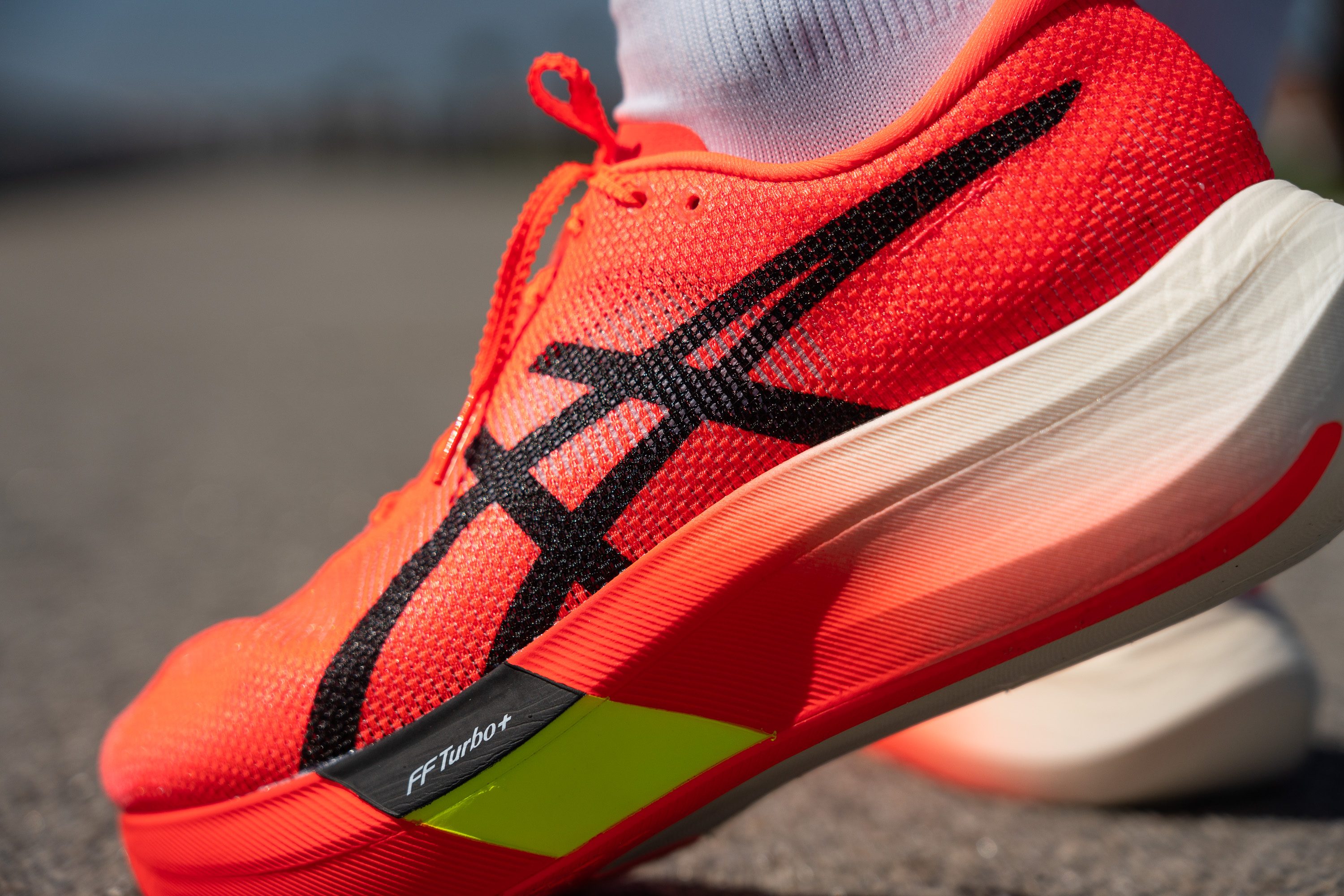
Transitioning from the stiffer FF Turbo to the more compliant and resilient FF Turbo+ (21.0 HA) marks a significant shift while running. This advanced supercritical PEBA foam has definitely leapfrogged its predecessor, which had lagged slightly behind the competition like ZoomX.
Another benefit worth highlighting is the elimination of the break-in period featured by the old FF Turbo. Straight out of the box, the Metaspeed Sky Paris is ready to deliver.
Moreover, the improvements extend beyond just comfort and response. The midsole is notably lighter, allowing ASICS to shed significant weight despite an increase in stack height. And this reduction in weight did not compromise the shoe's performance at all—on the contrary, it enhanced it!
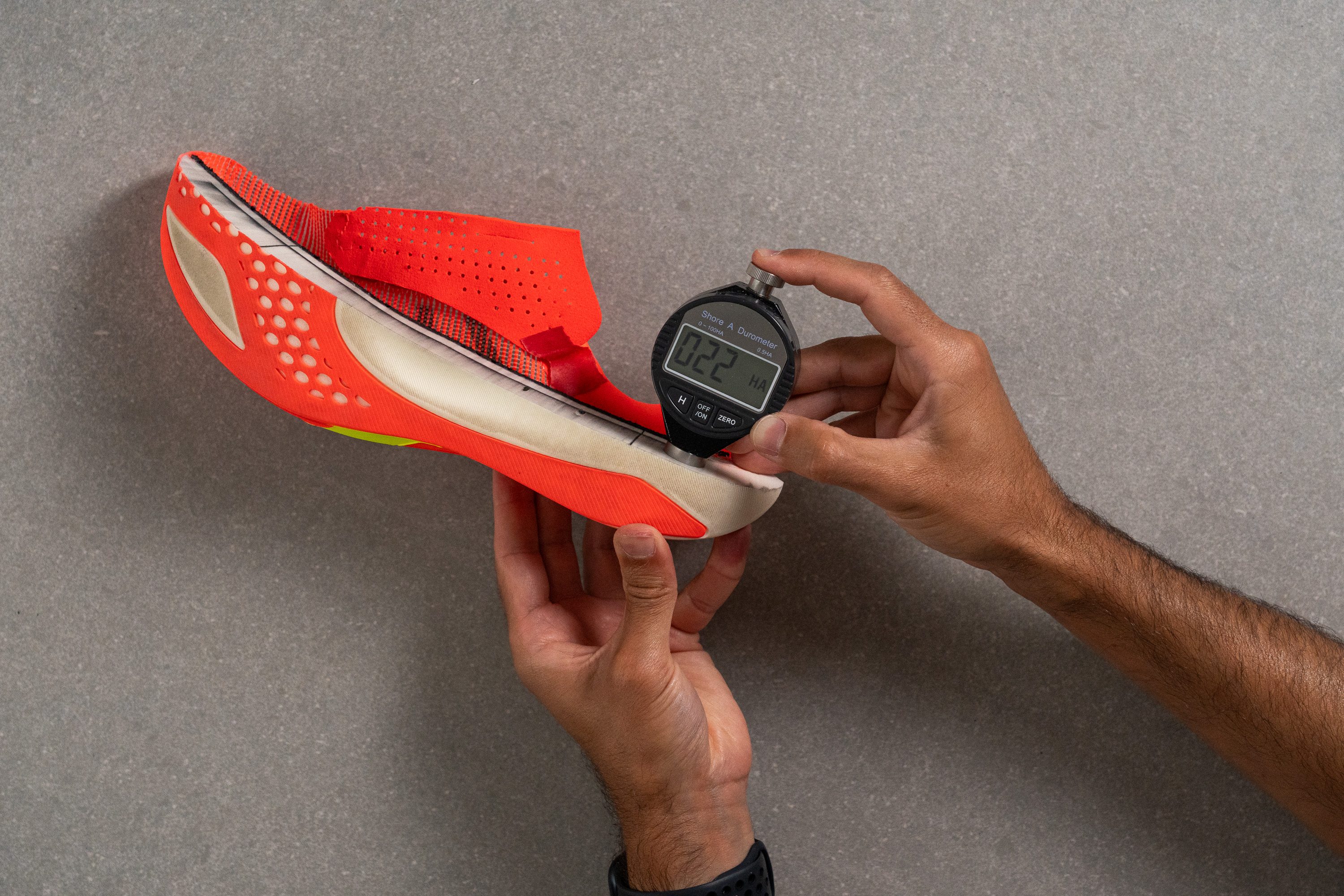
| Metaspeed Sky Paris | 21.0 HA |
| Average | 20.4 HA |
Rocker
We discovered that the Sky Paris features a late-stage toe rocker, which ideally suits forefoot and midfoot strikers. However, it's less favorable for heel strikers.
But, is this shoe completely unsuitable for rearfoot strikers? We don't believe so. In fact, it can still be really effective for those who land between the midfoot and heel with a neutral technique. However, for extreme heel strikers, this shoe's geometry might not be optimal. A smoother, continuous rocker, like the one we found in the Hoka Cielo X1, would likely be a better choice.
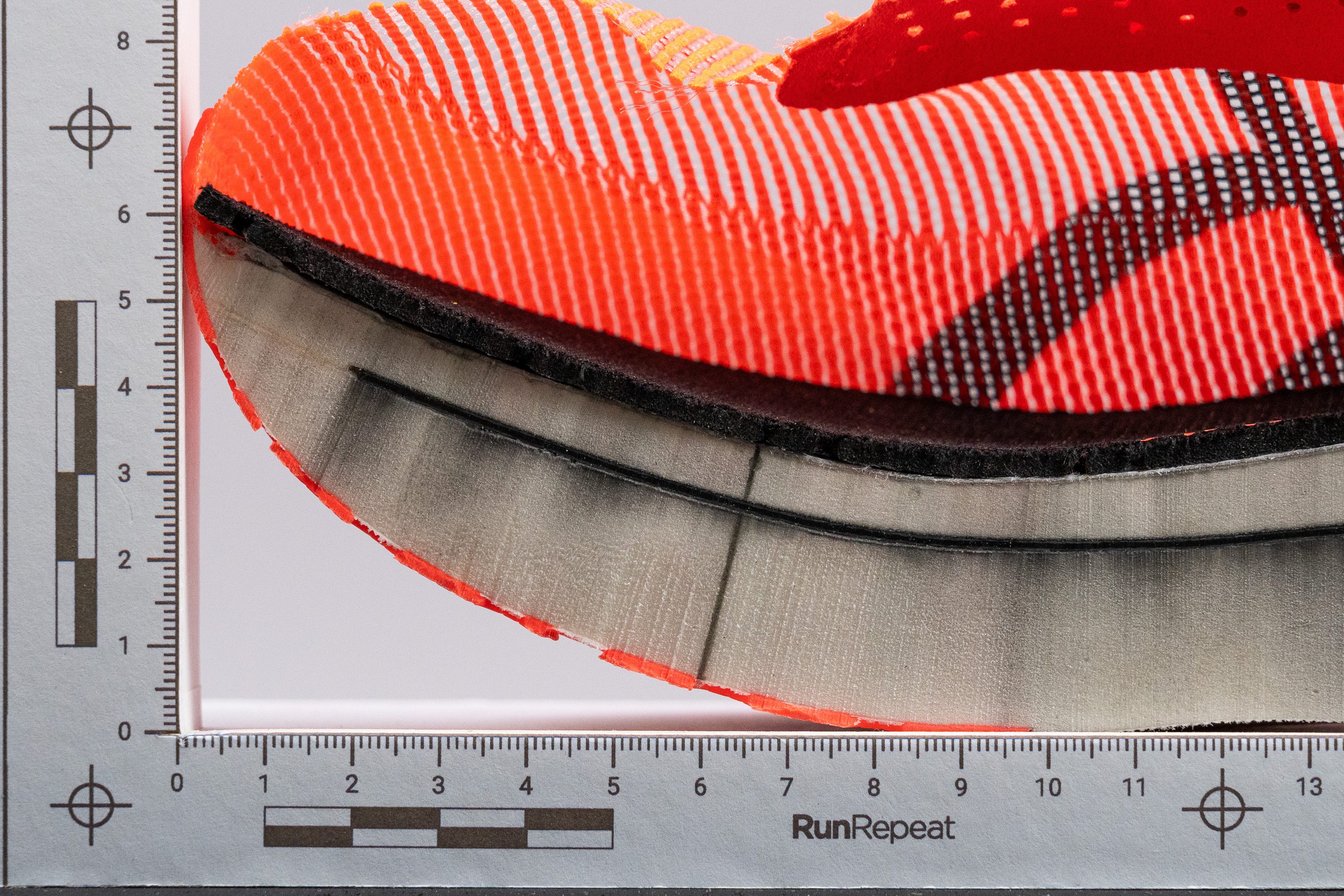
Carbon plate
The Metaspeed Sky series stands out from most super shoes because ASICS specifically markets this shoe for "stride" runners—those who increase their stride length while keeping their cadence constant when speeding up.
What sets it apart? It boils down to the plate design. Unlike the common spoon-shaped, curved plate found in most super shoes, the Sky Paris features a flat plate. This design doesn't much assist with turnover, but it excels in compressing the foam under the forefoot, resulting in significant bounce back with each stride.
For this reason, we're cautious about recommending this shoe to lighter runners. The effectiveness of this midsole configuration relies heavily on applying substantial force at the front of the plate. Hence, if you're a lighter or cadence-focused runner, a curved plate like the one in the Nike Vaporfly 3 will suit you better.
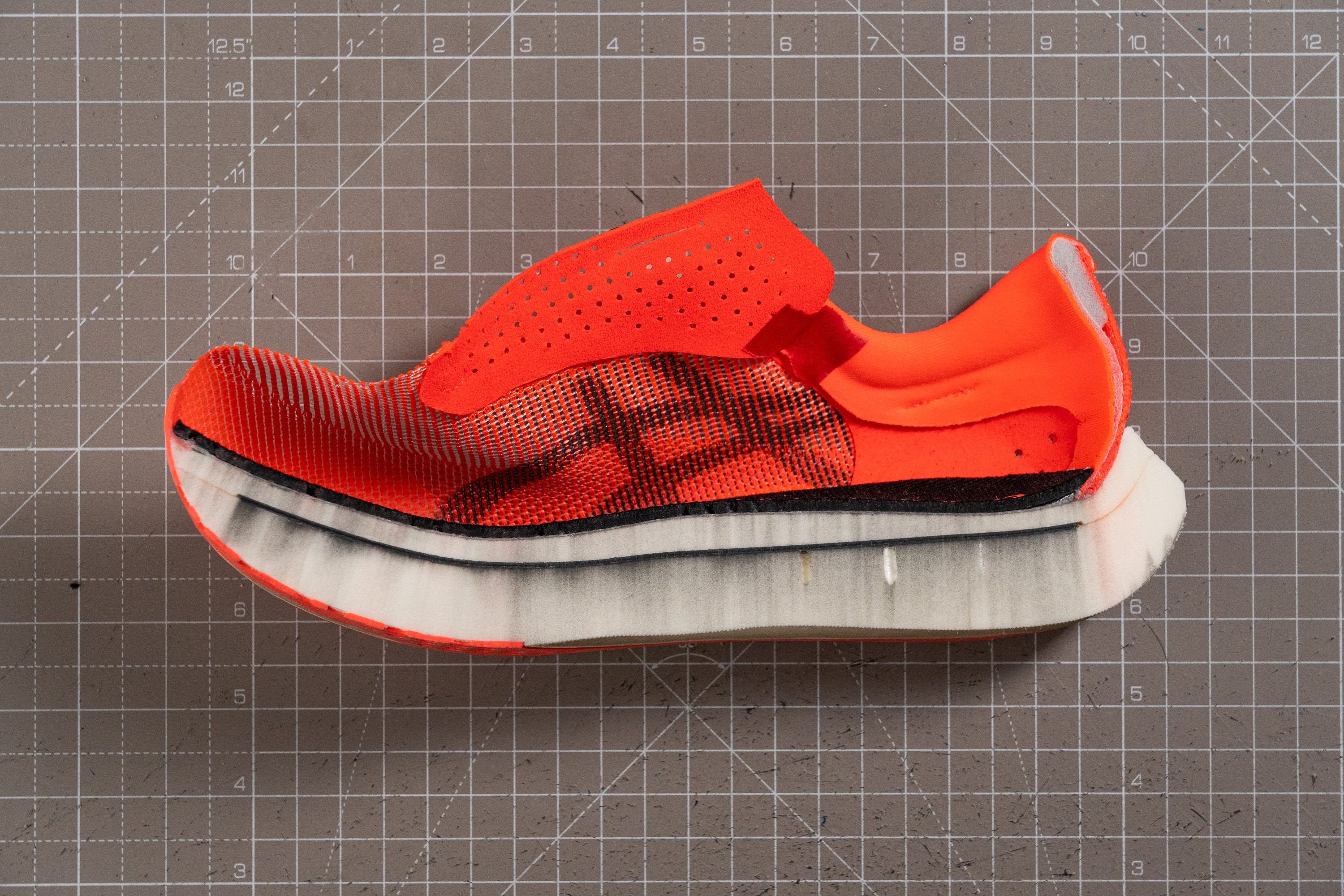
PEBA
One of the initial observations we made with the Sky Paris was that the midsole closely resembled the feel of ZoomX shoes, leading us to believe that ASICS might have nailed its FF Turbo+ formula, finally rivaling Nike's renowned superfoam. To verify this, turned to the microscope.
The findings were clear—they are essentially identical compounds, both made from PEBA. This is something that ASICS fans have been eagerly waiting for since 2017.
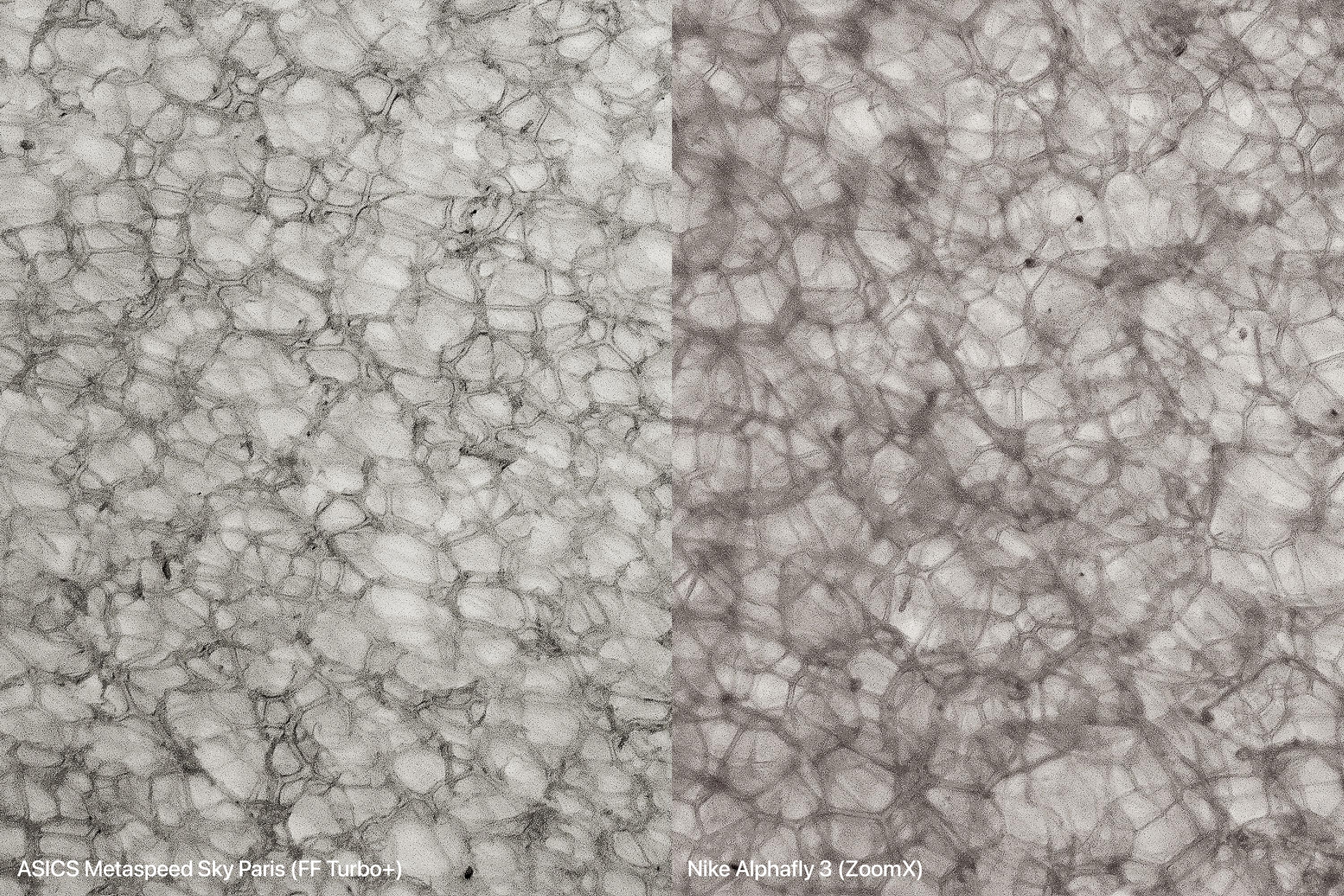
Size and fit
Size
ASICS Metaspeed Sky Paris fits slightly small (109 votes).
Internal length
| Metaspeed Sky Paris | 257.0 mm |
| Average | 269.4 mm |
Width / Fit
While the Sky Paris might look wide, the fit leans towards a snug, race-ready feeling, expected for a super shoe.
We tested this by creating a gel cast of the shoe's interiors to take precise measurements. Our first reading confirmed our impressions: a compact 92.3 mm. That's significantly below average, emphasizing its performance-driven design.
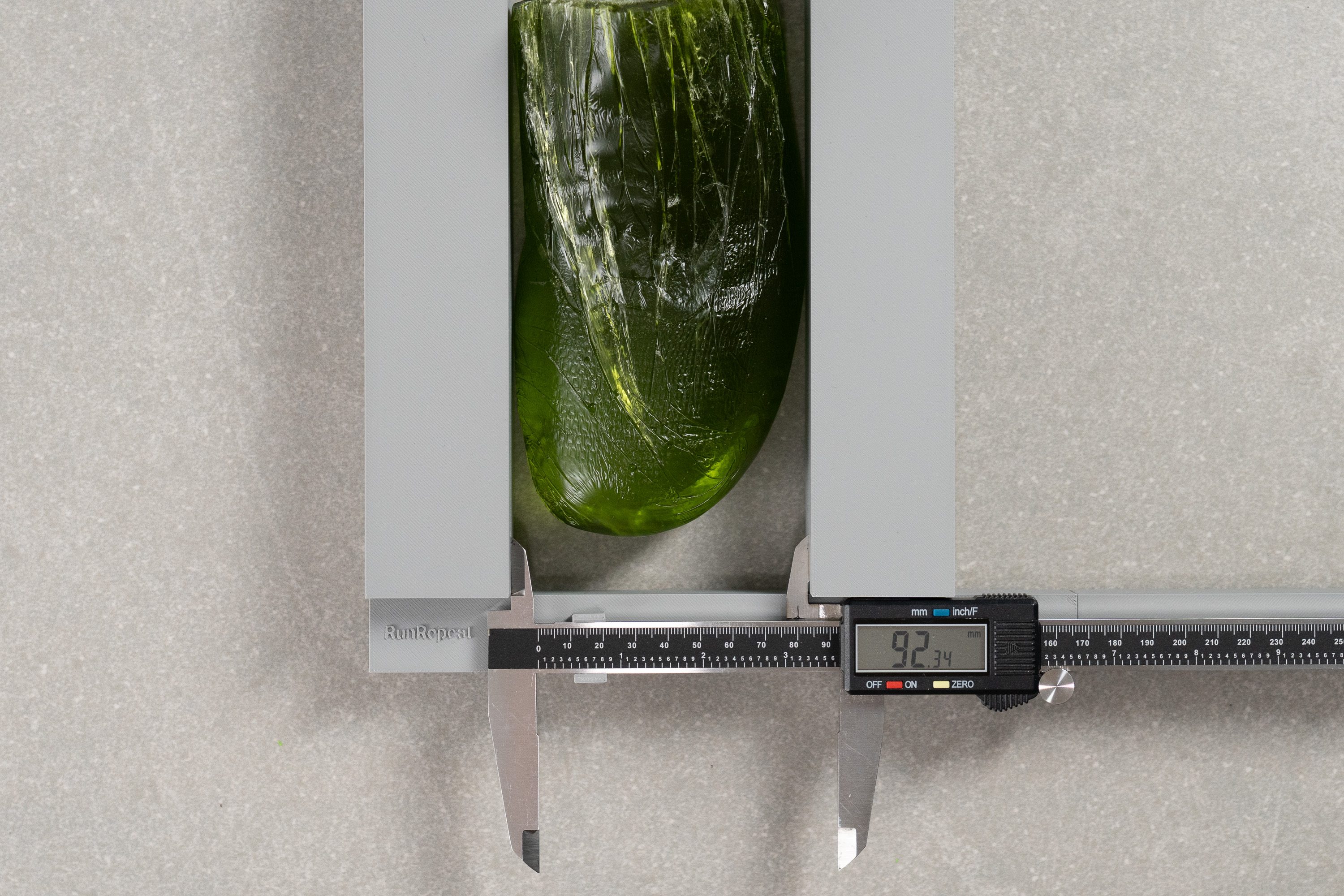
| Metaspeed Sky Paris | 92.3 mm |
| Average | 95.1 mm |
Toebox width
We always perform two measurements to ensure a complete analysis. Based on our second reading of 73.4 mm, the Sky Paris's toebox width sits just around the average width of running shoes we've tested so far.
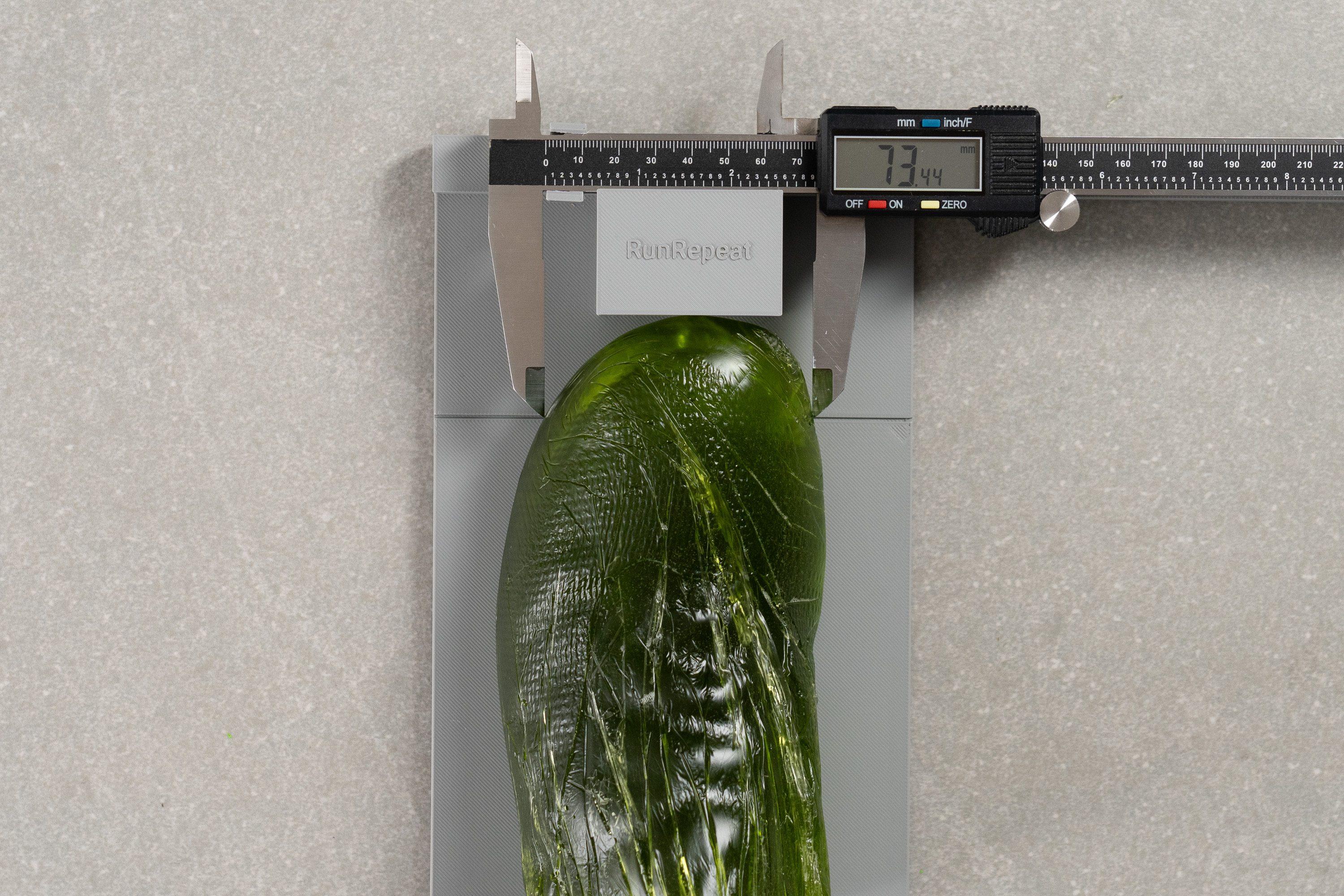
| Metaspeed Sky Paris | 73.4 mm |
| Average | 73.3 mm |
Toebox height
Those with high-volume feet or anyone who dislikes how many super shoes press down on the toes will appreciate the MOTIONWRAP 2.0 upper.
At 30.4 mm, the Sky Paris provides excellent room for runners who tend to point their toes upward during high-speed running.
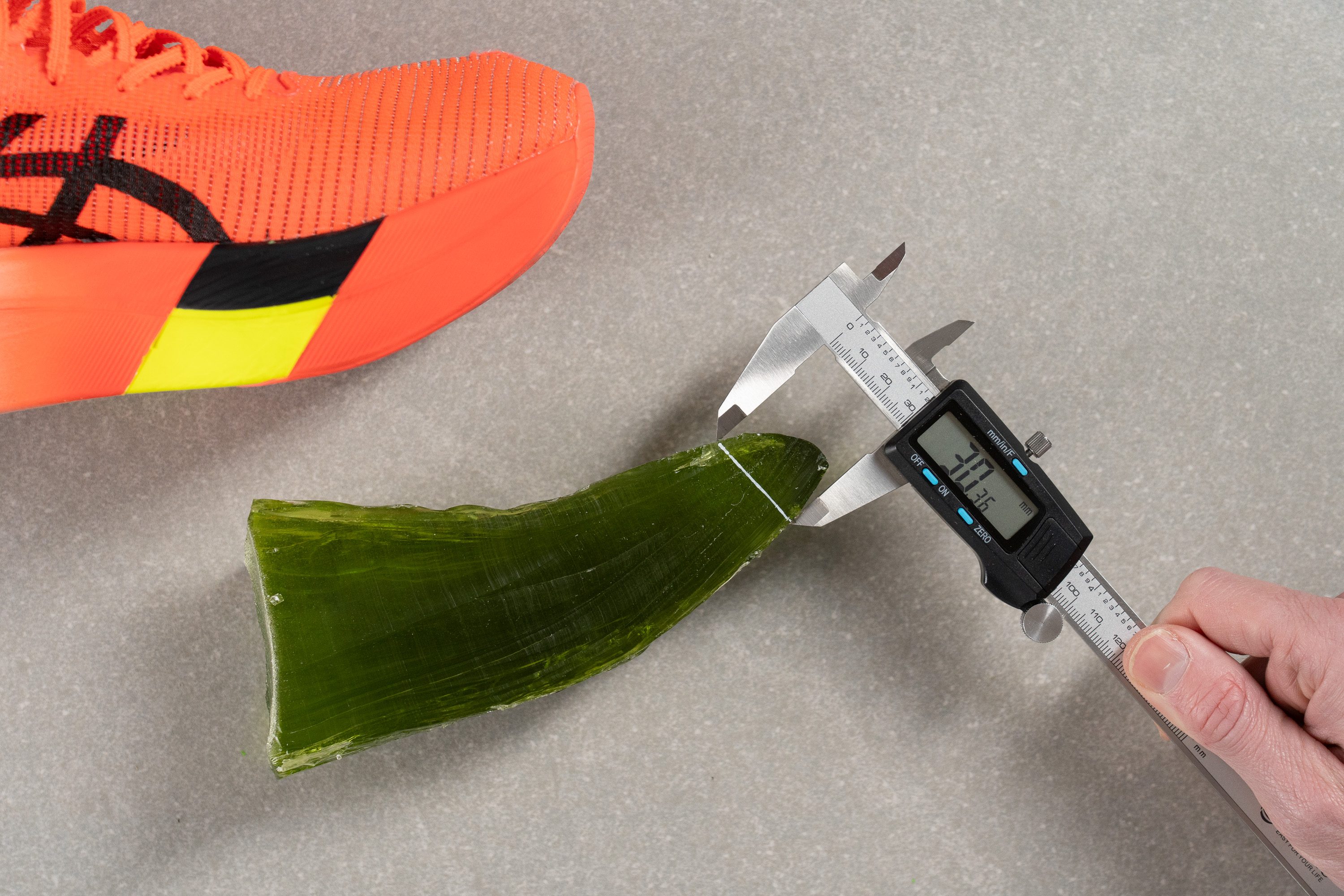
| Metaspeed Sky Paris | 30.4 mm |
| Average | 27.0 mm |
Traction / Grip
Traction test
With ASICSGRIP rubber underfoot, we expected the Metaspeed Sky Paris to shine in our grip test—and it didn’t let us down. While traction slightly dipped compared to the Sky+, it still held a top-tier position.
We tested it thoroughly and found a friction score of 0.74. That’s a phenomenal result, especially considering how much exposed foam is on the outsole to cut weight. Therefore, we switched off the machine fully satisfied—the Metaspeed still clings with confidence, making wet races far less intimidating... and dangerous!
| Metaspeed Sky Paris | 0.74 |
| Average | 0.49 |
Outsole design
The outsole offers excellent coverage in the forefoot, though it transitions to mostly exposed foam from the midfoot to the heel. However, the narrow strip on the lateral side is a valuable addition, particularly beneficial for underpronators.
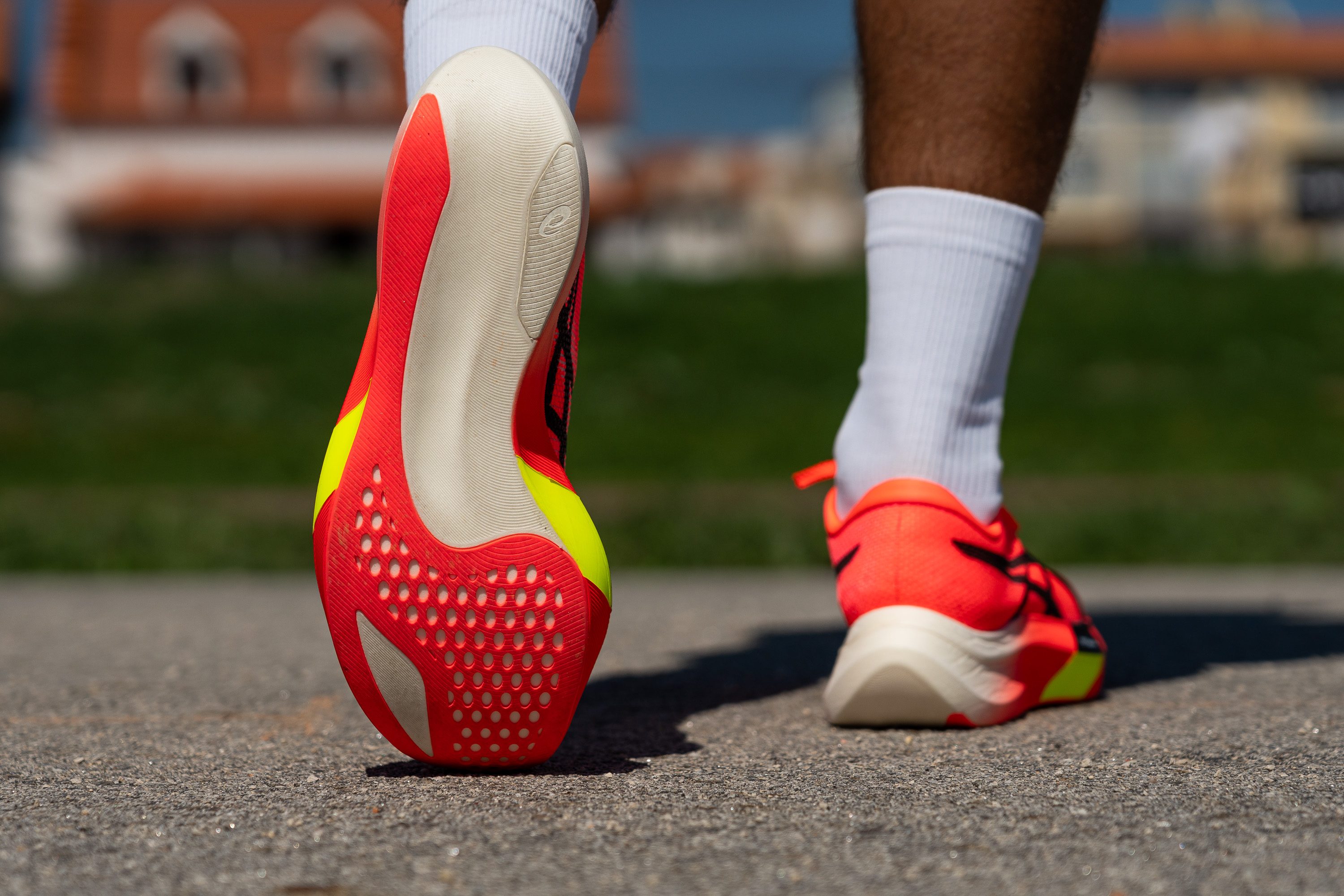
Flexibility / Stiffness
Equipped with a carbon plate, we expected an exceptionally high score in our standardized 30-degree bend test, yet the result was a bit lower than other super shoes at 23.6N. This confirms that, despite incorporating a full-length carbon plate, it feels less rigid compared to rival shoes like the Nike Alphafly 3.
Why is this change significant? A wide, stiff plate, like in the Sky+, is ideal for runners with strong calves in terms of running economy. However, for the average runner, it proved too demanding, especially in the last 10K of the marathon. The Sky Paris, with its less stiff plate, offers a more reasonable experience for most runners, who may not have as robust calf muscles.
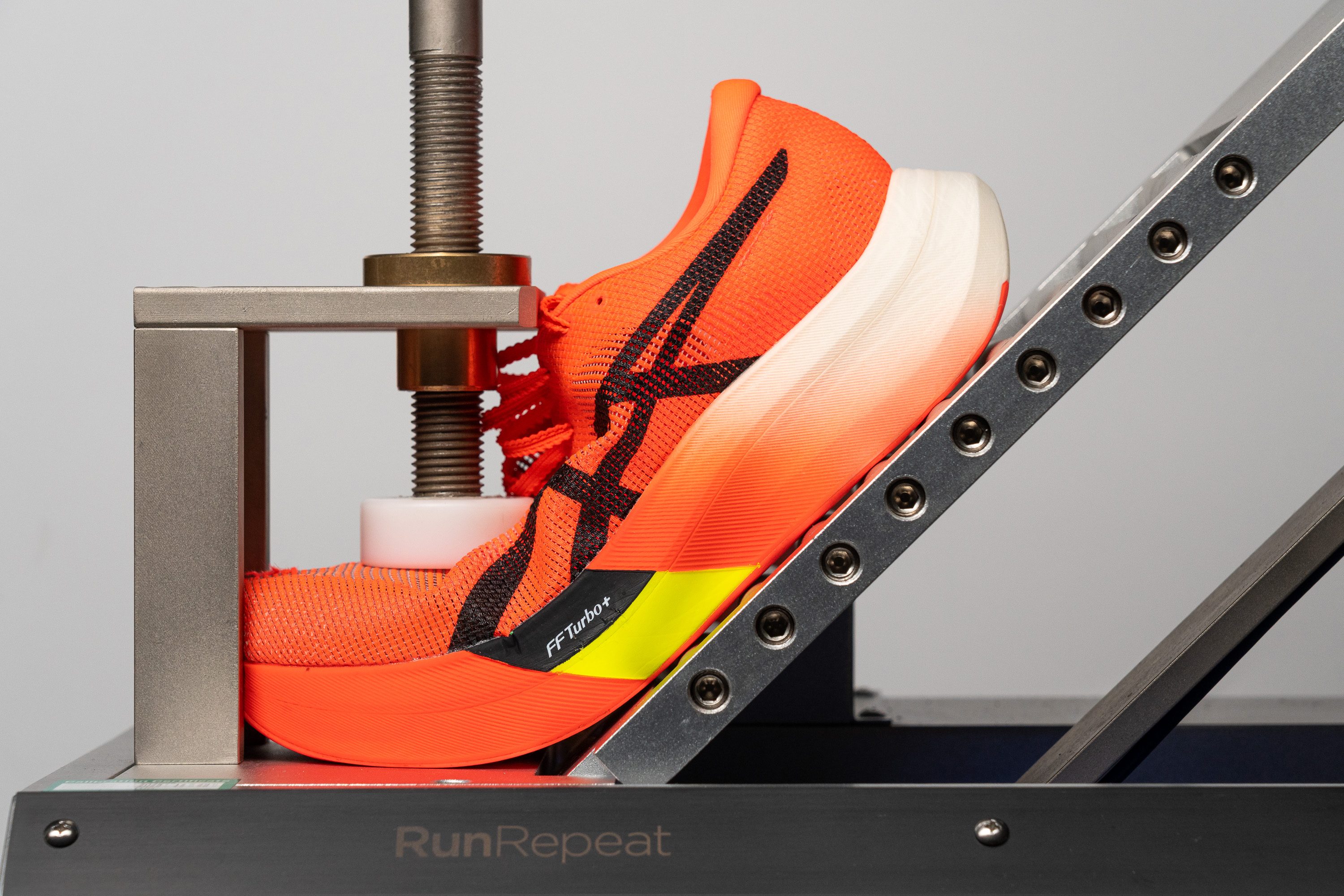
| Metaspeed Sky Paris | 23.6N |
| Average | 15.3N |
Weight
The Metaspeed Sky Paris has wowed us in numerous ways, yet its most striking feature is undoubtedly its weight. ASICS has done an exceptional job at not only reducing the weight from its previous model but also surpassing its competitors.
Weighing in at just 6.5 oz (183g), it currently stands as the lightest mass-produced super shoe on the market. Achieving such a milestone is no small feat, especially when contending with giants like Nike, Adidas, New Balance, and Saucony.
A significant portion of the weight reduction can be attributed to the all-new FF Turbo+ midsole. Additionally, they've successfully trimmed down the weight of both the upper, insole and the outsole. The result is a masterpiece that clearly sets itself apart from competitors such as the New Balance SC Elite v4 (8.2 oz - 232g) and the Hoka Rocket X 2 (7.7 oz - 218g).
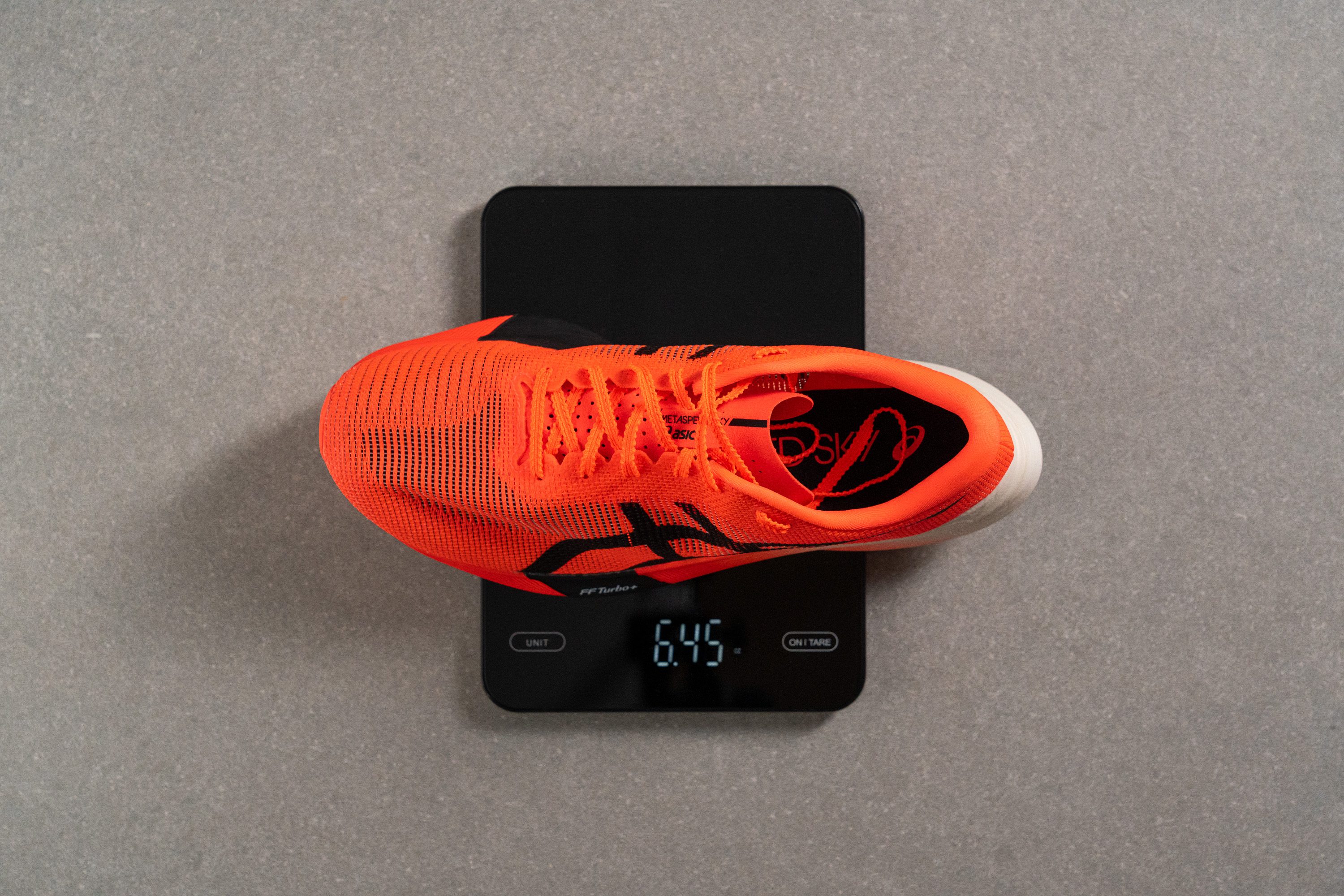
| Metaspeed Sky Paris | 6.5 oz (183g) |
| Average | 9.3 oz (264g) |
Breathability
We discovered that ASICS is dedicated to creating uppers that really stand out in their premium shoes, skillfully using different densities to effectively balance support and ventilation.
The Metaspeed Sky Paris features this innovation, named MOTIONWRAP 2.0. Not only is the name catchy, but the upper itself is impressive—a finely engineered mesh that we proved to be exceptionally breathable while remaining stretchy and comfortable for a racing shoe.
Through the previous smoke test, we demonstrated the upper's excellent 5-out-of-5 airflow rating. We also used a light test to showcase how thin the upper is, especially in the toebox and midfoot areas, which might not be immediately apparent.
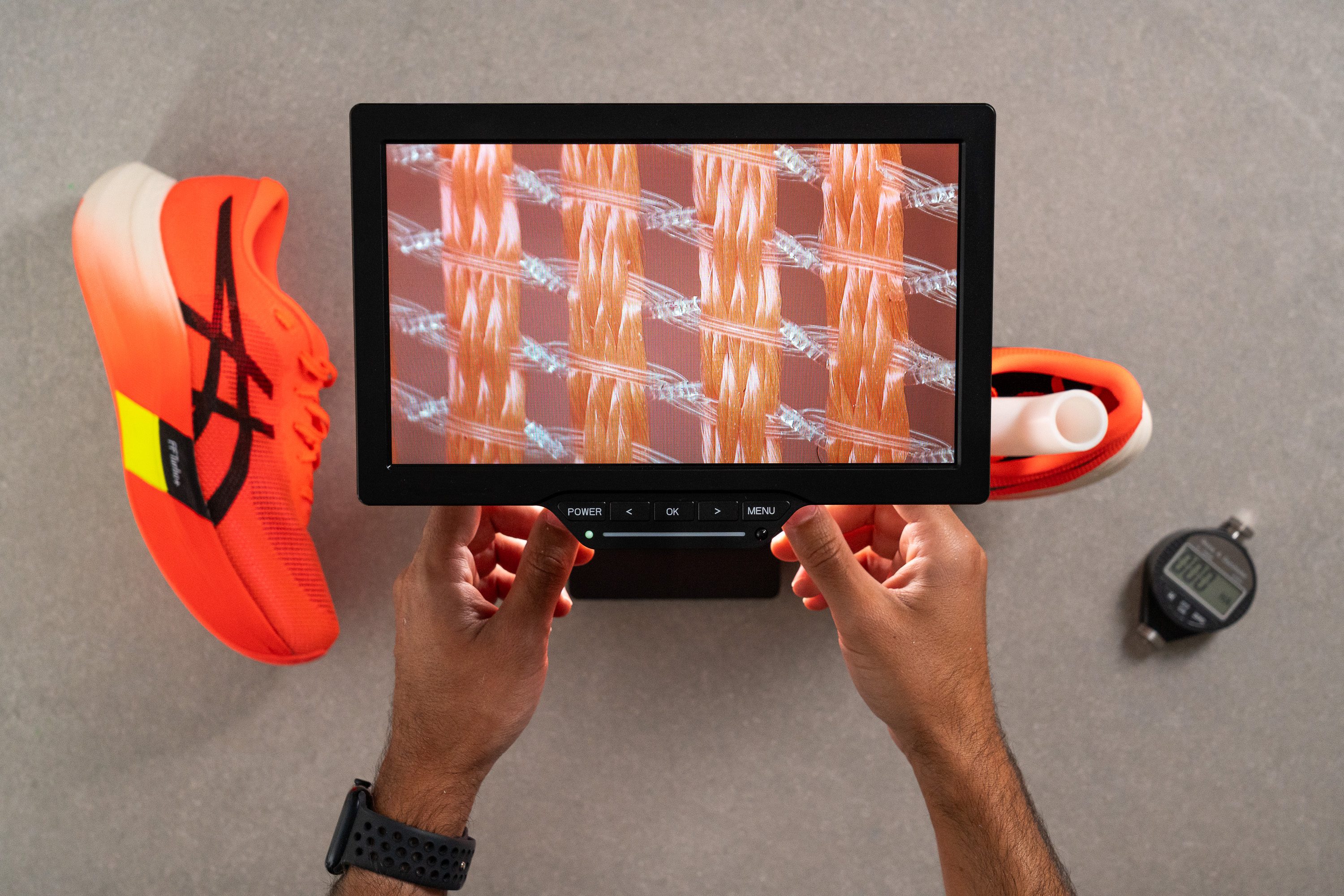
Using our microscope, we uncovered the intricacies of the MOTIONWRAP 2.0 technology. It was fascinating to see how ASICS strategically uses thicker or thinner yarns tailored to the needs of different areas of the upper.
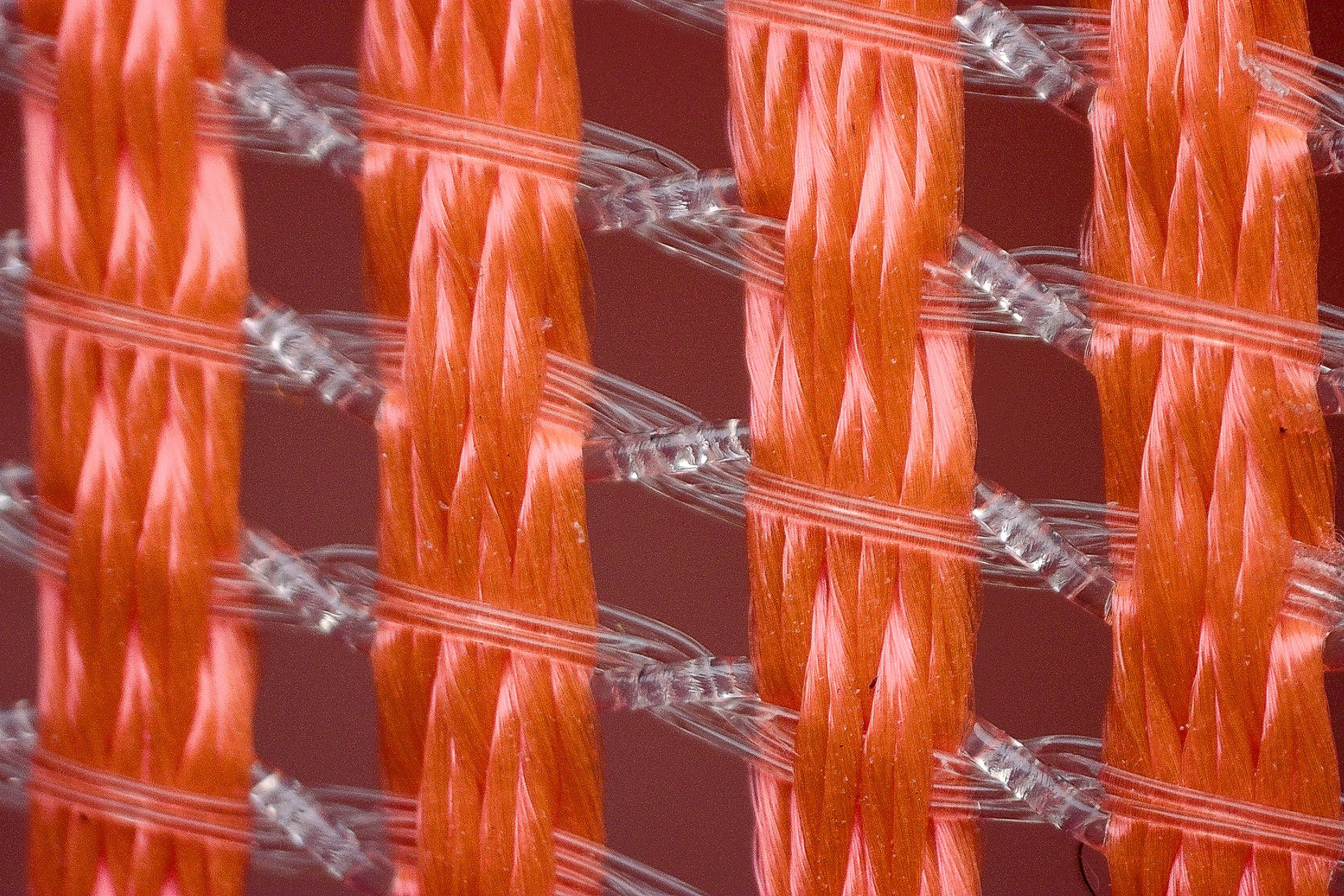
We also found this minimalist, monomesh upper surprisingly comfortable, though obviously less plush than what you'd find in a daily trainer. However, we can confidently say it marks a significant improvement over the Metaspeed Sky+.
The Sky Paris features some exquisite details we absolutely adored—some of them rarely seen in even other high-end shoes. For instance, can you name another running shoe that incorporates ventilation holes in the heel?
And despite being a racing shoe designed for minimal weight, the padding in the heel collar is generous, surpassing many training shoes.
| Metaspeed Sky Paris | 5 |
| Average | 3.7 |
Stability
Lateral stability test
One of the most cherished aspects of the previous Metaspeed models was their stability, which is remarkable for racing shoes. However, the latest version sees an inevitable reduction in stability due to an increased drop, higher stack height, and softer foam.
Honestly, we're pretty happy with this trade-off. Even though this model's stability is not as good as it used to be, we believe it's still adequate for a super shoe. Moreover, the enhancements in energy return and responsiveness are significant, making this a worthy choice for most runners.
Torsional rigidity
Given the inclusion of a carbon plate, we expected a 5/5 in this test, and the Metaspeed Sky Paris certainly lived up to our predictions. Its super stiff feel underfoot at all paces makes it less suitable for easy runs, though. It's clear that this shoe is just built for speed.
| Metaspeed Sky Paris | 5 |
| Average | 3.5 |
Heel counter stiffness
One of the standout features of the Metaspeed series is the heel counter, which resembles that of a daily trainer more than a typical racing shoe.
We were pleased to rate it a 2/5 in this test, as it offers more support and comfort compared to the typically ultra flexible options from other super shoes.
| Metaspeed Sky Paris | 2 |
| Average | 2.9 |
Midsole width - forefoot
The design of the Sky Paris features a wide forefoot contrasted with an ultra-narrow heel, clearly intended for those who primarily use the front of their foot for striking.
Our measurements support this design idea, revealing a forefoot width of 114.9 mm. This provides a broad base for applying force and enhancing power transfer to the ground, optimizing running economy for midfoot and forefoot strikers.
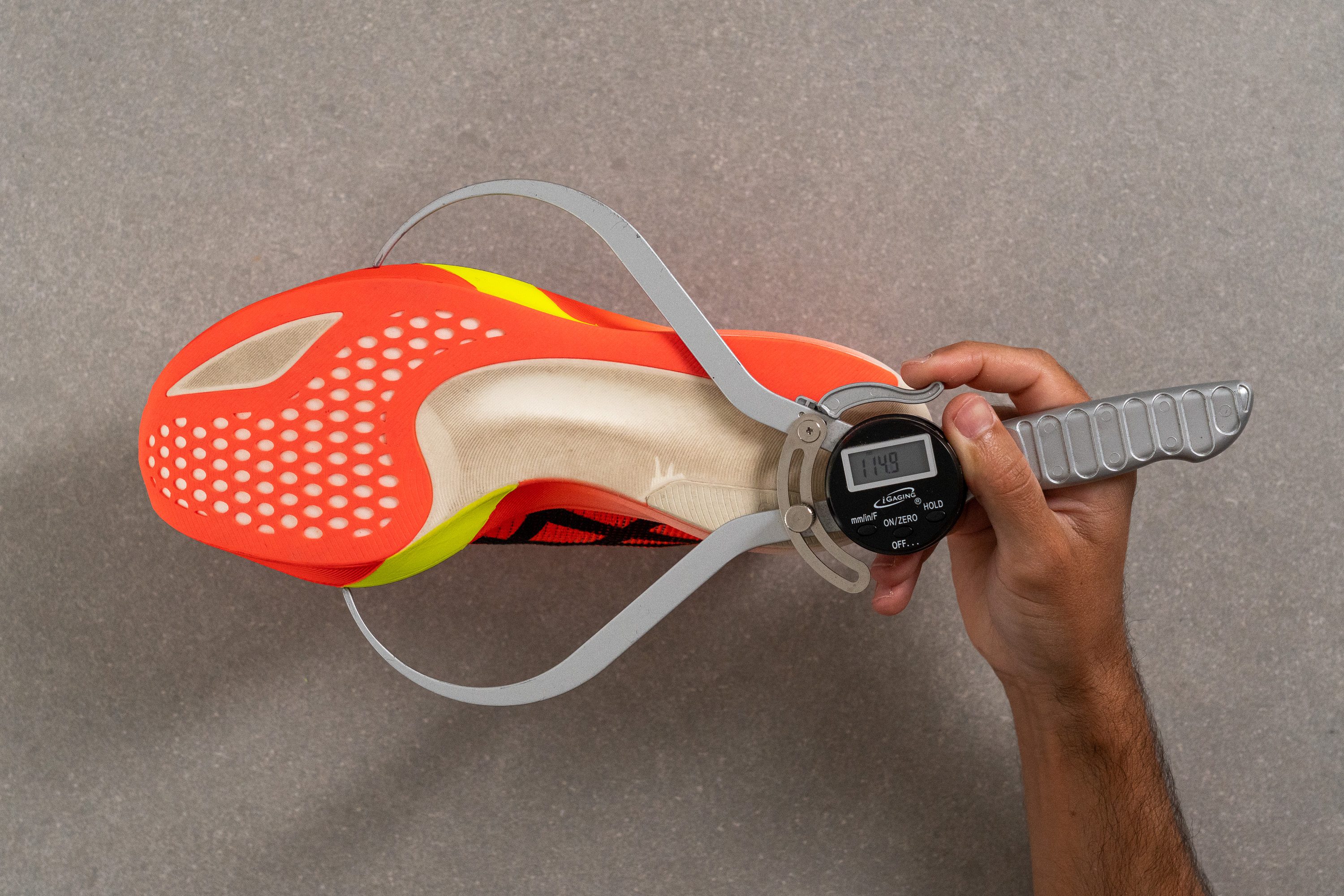
| Metaspeed Sky Paris | 114.9 mm |
| Average | 114.4 mm |
Midsole width - heel
In stark contrast, the heel of the shoe is exceptionally narrow and hence not stable at all, measuring just 77.8 mm. This design further underscores why we firmly believe this shoe is not an optimal choice for heel strikers.
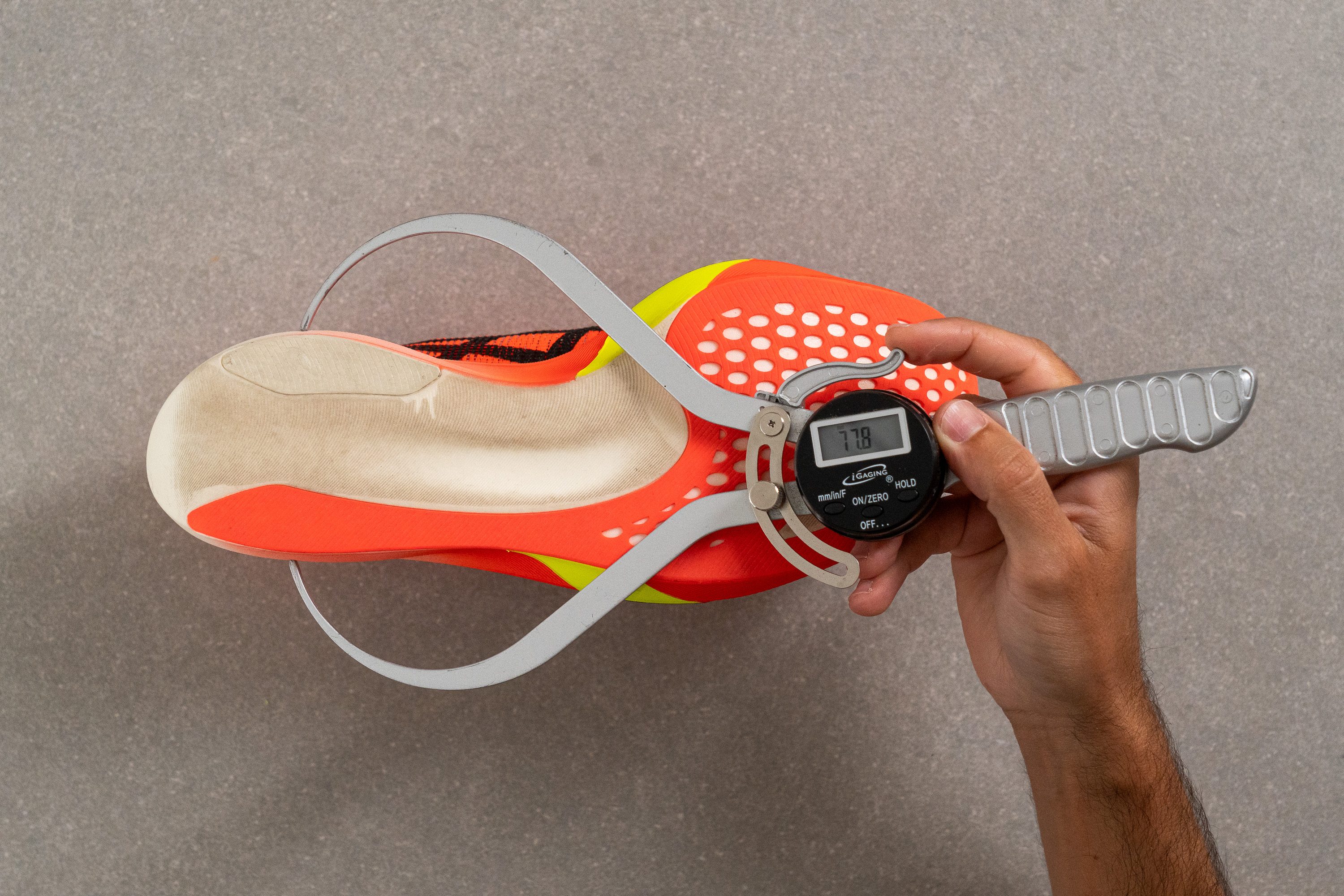
| Metaspeed Sky Paris | 77.8 mm |
| Average | 90.6 mm |
Durability
Toebox durability
Crafting an excellent upper is certainly no simple feat—it needs to be both breathable and durable. We found that the Metaspeed Sky Paris excels in meeting both challenges.
In our initial durability test using a Dremel tool, the Metaspeed Sky Paris surpassed most marathon shoes, earning an impressive 4/5 score—a rare achievement for monomesh uppers that also provide good ventilation.
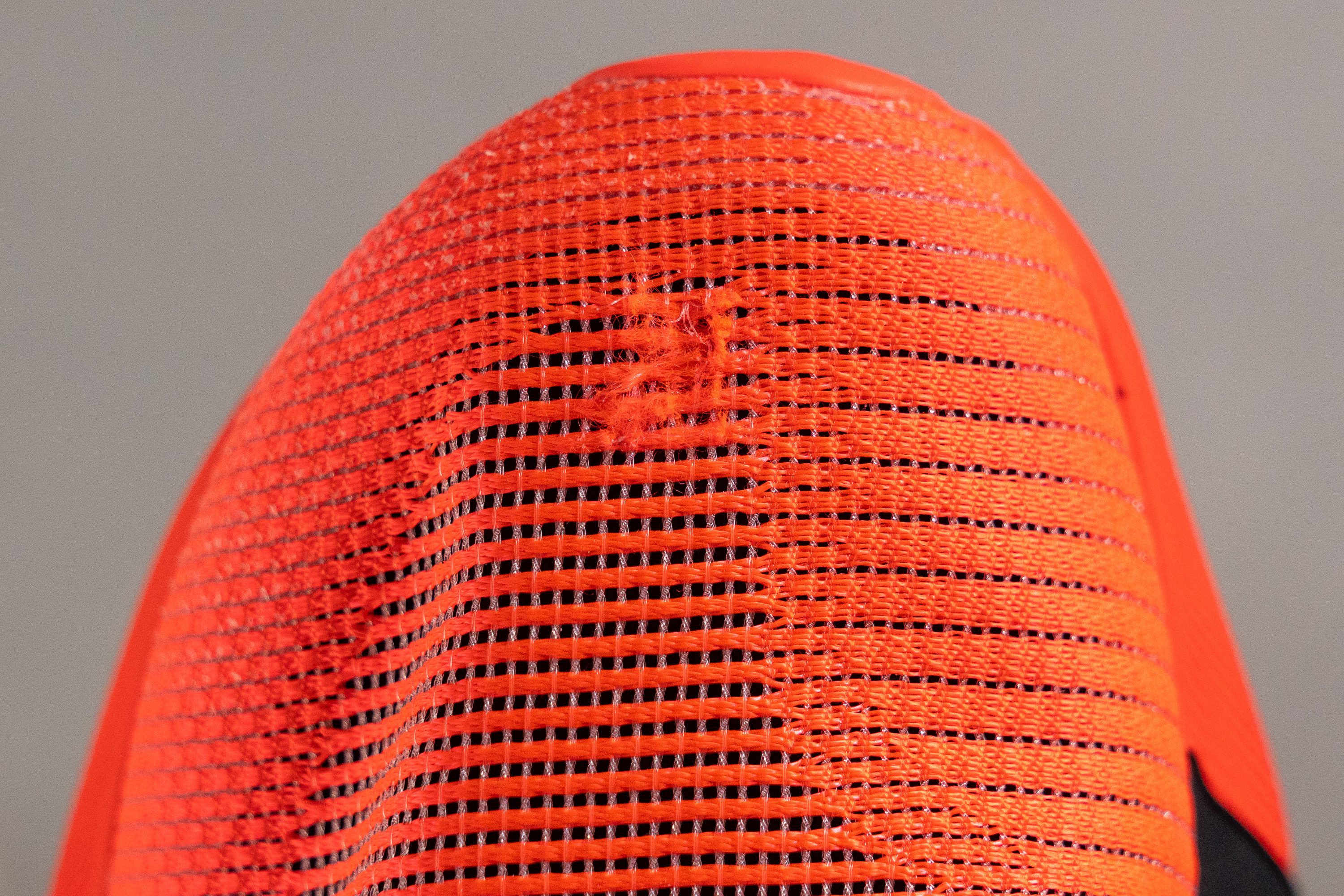
| Metaspeed Sky Paris | 4 |
| Average | 2.6 |
Heel padding durability
All the Metaspeed models consistently featured an exceptional heel collar, and we've observed that ASICS continues to lead the market in this domain with the Paris lineup, providing not only superior comfort but also outstanding durability.
We conducted our standard Dremel test—applying a force of 3.2N at 5,000 RPM for five seconds. The shoe not only met but exceeded our expectations, earning a perfect score of 5/5.
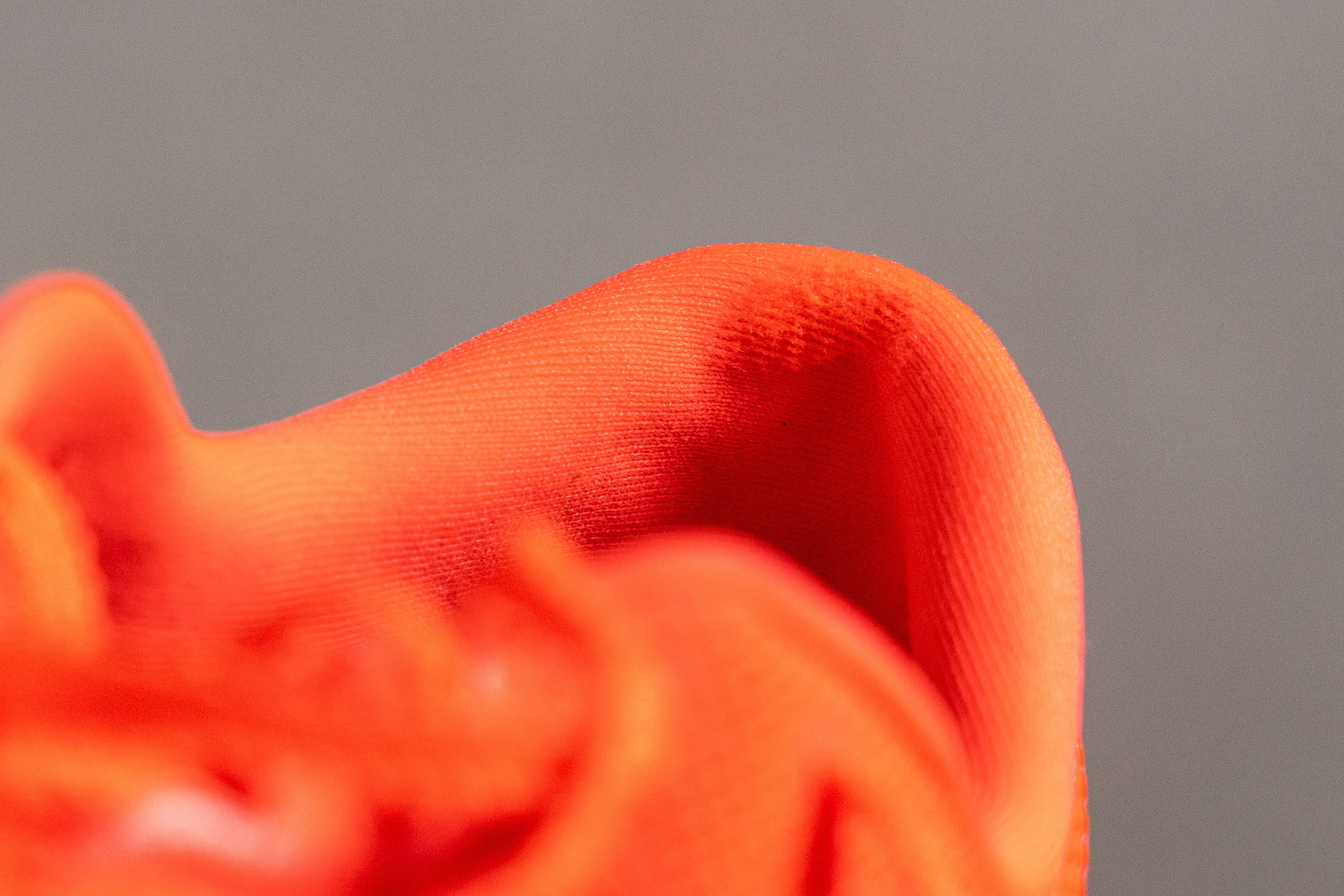
| Metaspeed Sky Paris | 5 |
| Average | 3.4 |
Outsole durability
To assess its durability, we cranked up the Dremel in the lab for one final test today, running it at 10K RPM to maximally stress the outsole.
The results were impressive—a mere 0.8 mm dent was all we found. And while we've seen better performance in other running shoes, achieving such minimal damage with this soft of a rubber is quite extraordinary. We proved that the Metaspeed Sky Paris is one of the top-performing super shoes in terms of outsole durability.
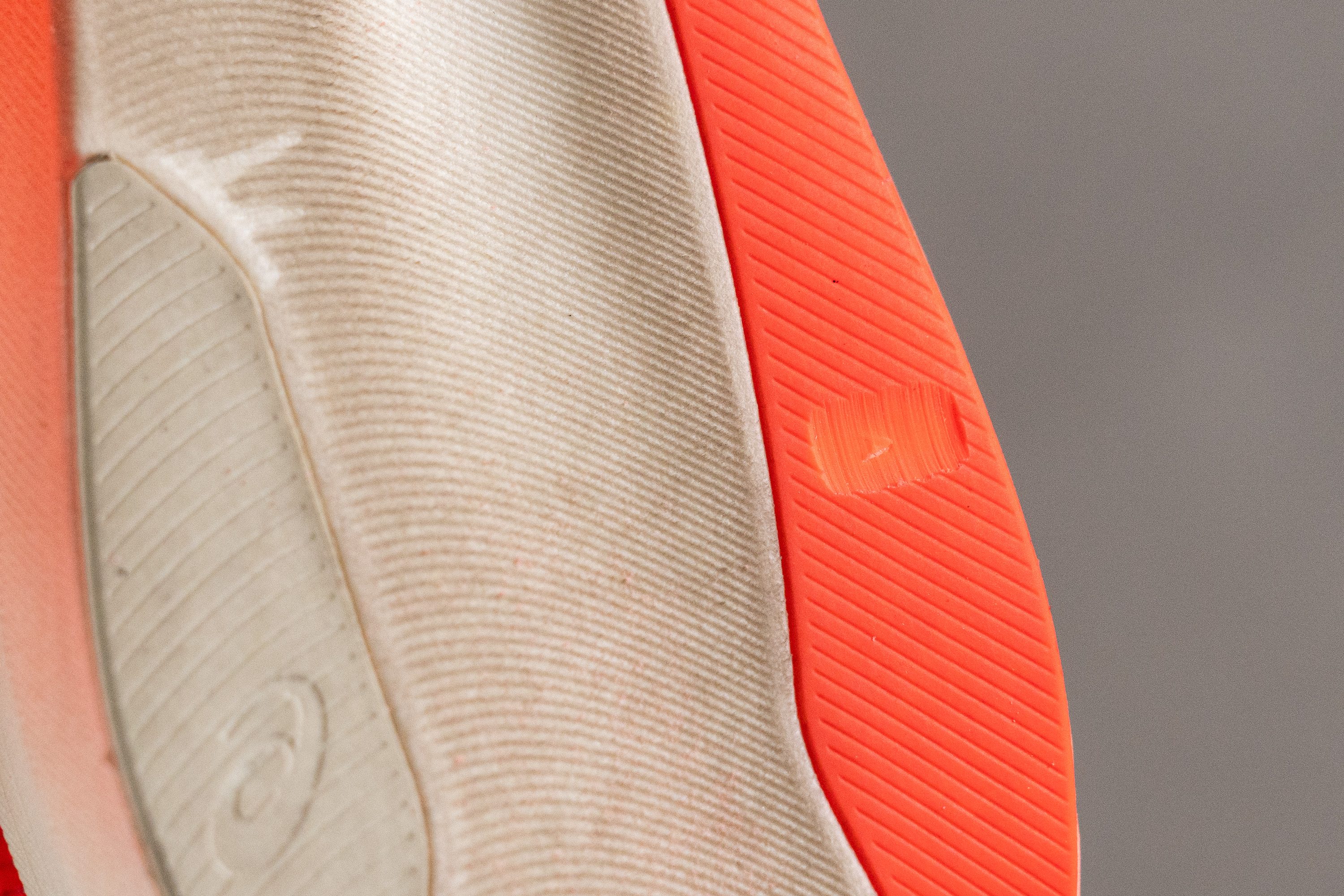
| Metaspeed Sky Paris | 0.8 mm |
| Average | 1.1 mm |
Outsole thickness
To conclude our assessment of the outsole, we pulled out the vernier caliper and measured the thickness implemented by ASICS at 2.10 mm. Given the impressive durability we observed earlier, this thickness appears to be quite sufficient. Remember: it's a competition shoe!
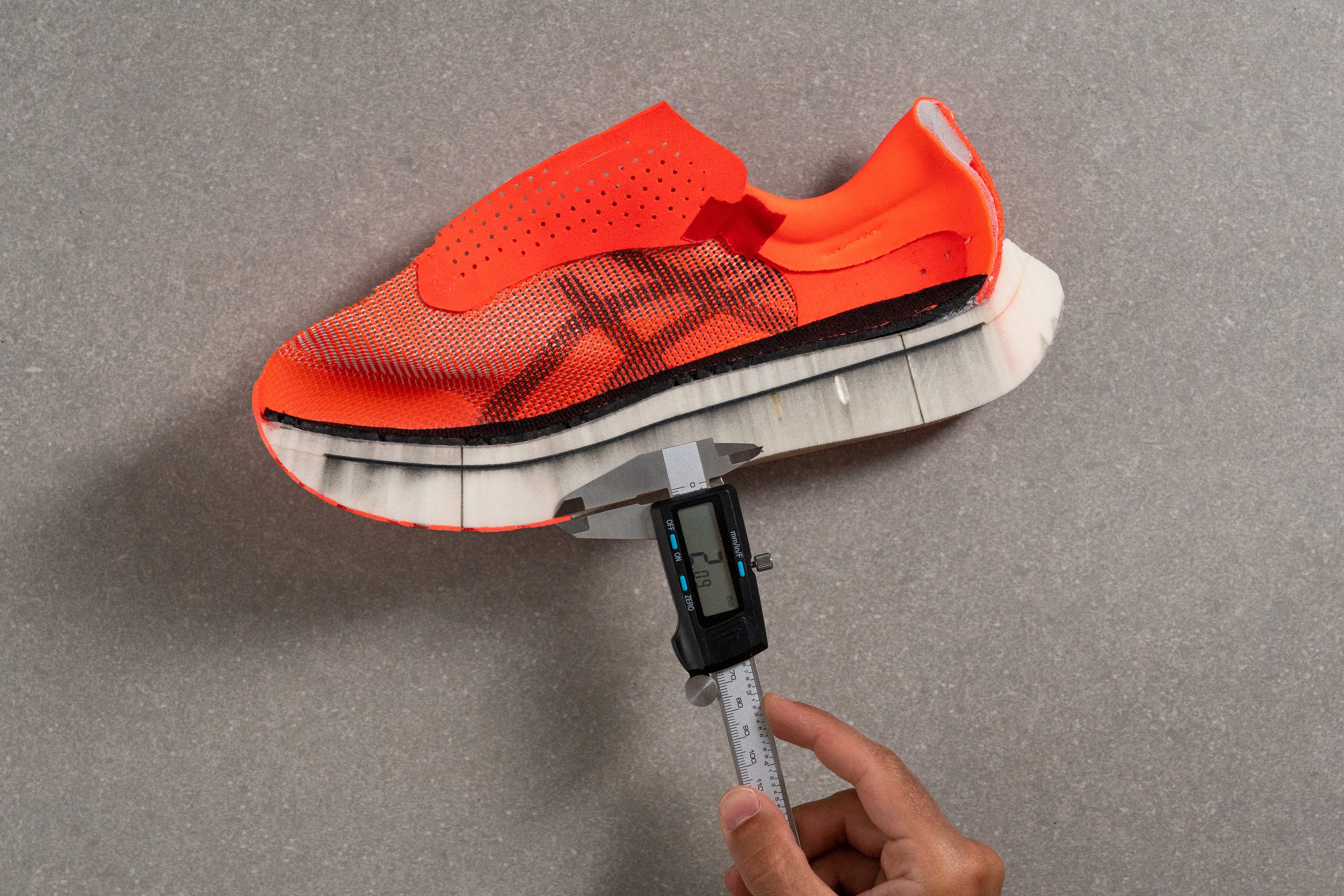
| Metaspeed Sky Paris | 2.1 mm |
| Average | 3.2 mm |
Misc
Insole thickness
To maximize the foam in the midsole while ensuring the shoe stays under the 40 mm race-day legal limit, ASICS opted for a thin insole, which we measured at just 3.3 mm.
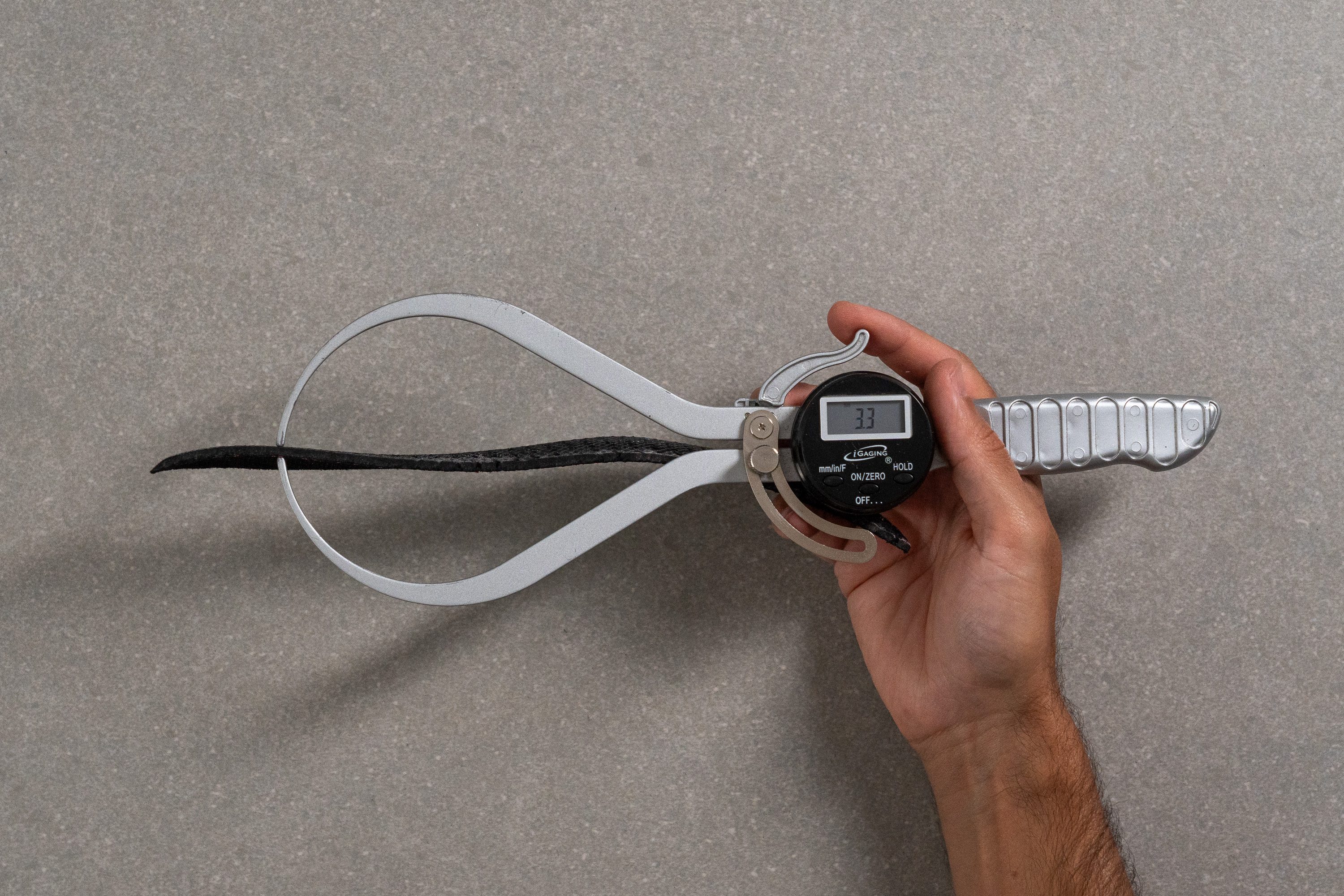
| Metaspeed Sky Paris | 3.3 mm |
| Average | 4.5 mm |
Removable insole
Some super shoes have their insoles glued to the last, which isn't ideal for those who need custom footbeds. Fortunately, the Sky Paris doesn’t have this limitation, making it a flexible option for various foot needs.
However, we advise against swapping out the original sockliner. It ranks among the best we've tested in any running shoe, with exceptional ventilation due to its perforations—a nice feature in a racing shoe with a thick, heat-generating midsole.
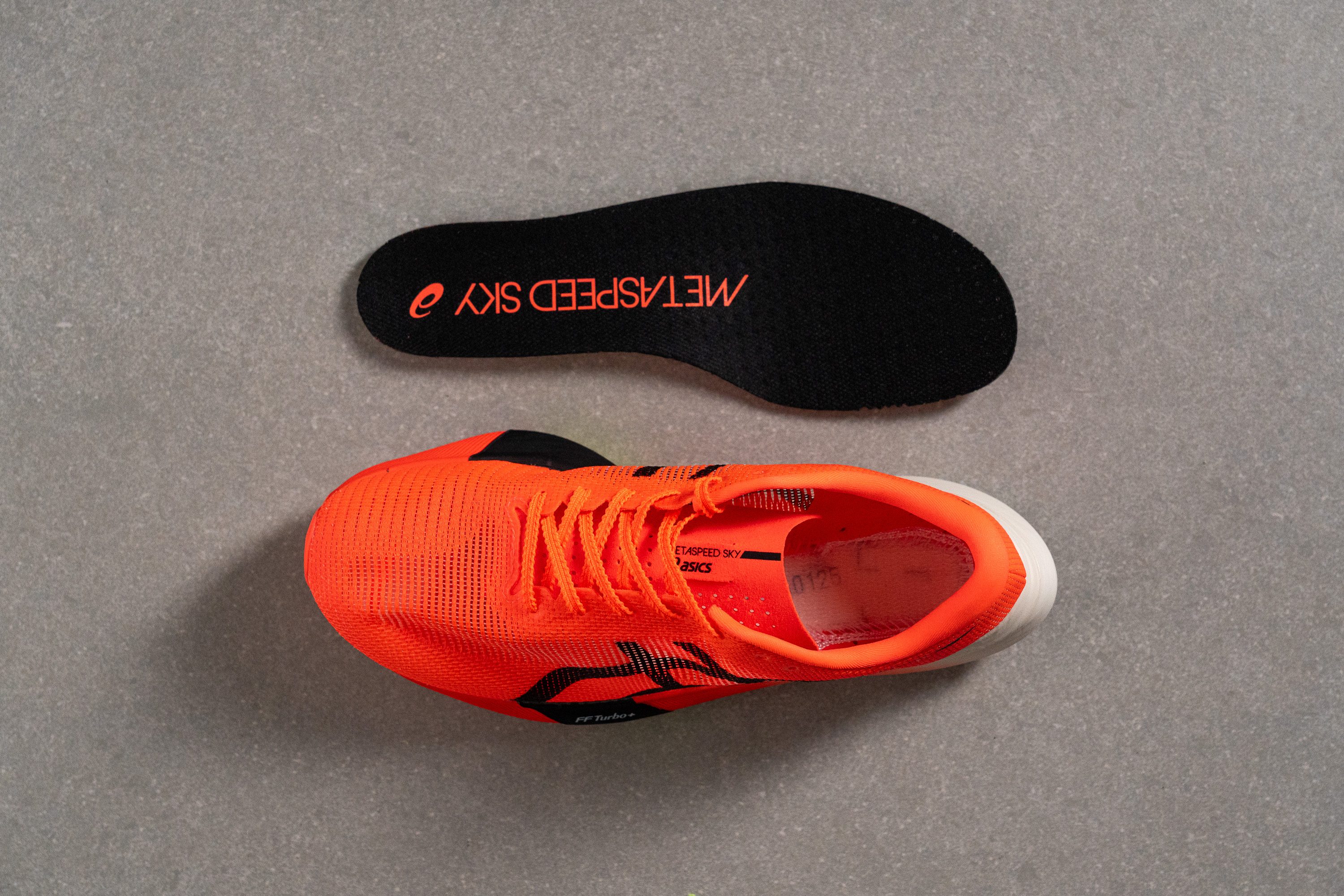
| Metaspeed Sky Paris | Yes |
Midsole softness in cold (%)
In our lab, we conducted a cold-resistance test on the Metaspeed Sky Paris by placing it in a freezer alongside our pistachio ice creams for 20 minutes before reassessing the midsole's softness.
The results were quite impressive—the foam's softness decreased by only 6%, which stands out as one of the best outcomes we've observed. However, that's what we expect from a top-tier, PEBA midsole.
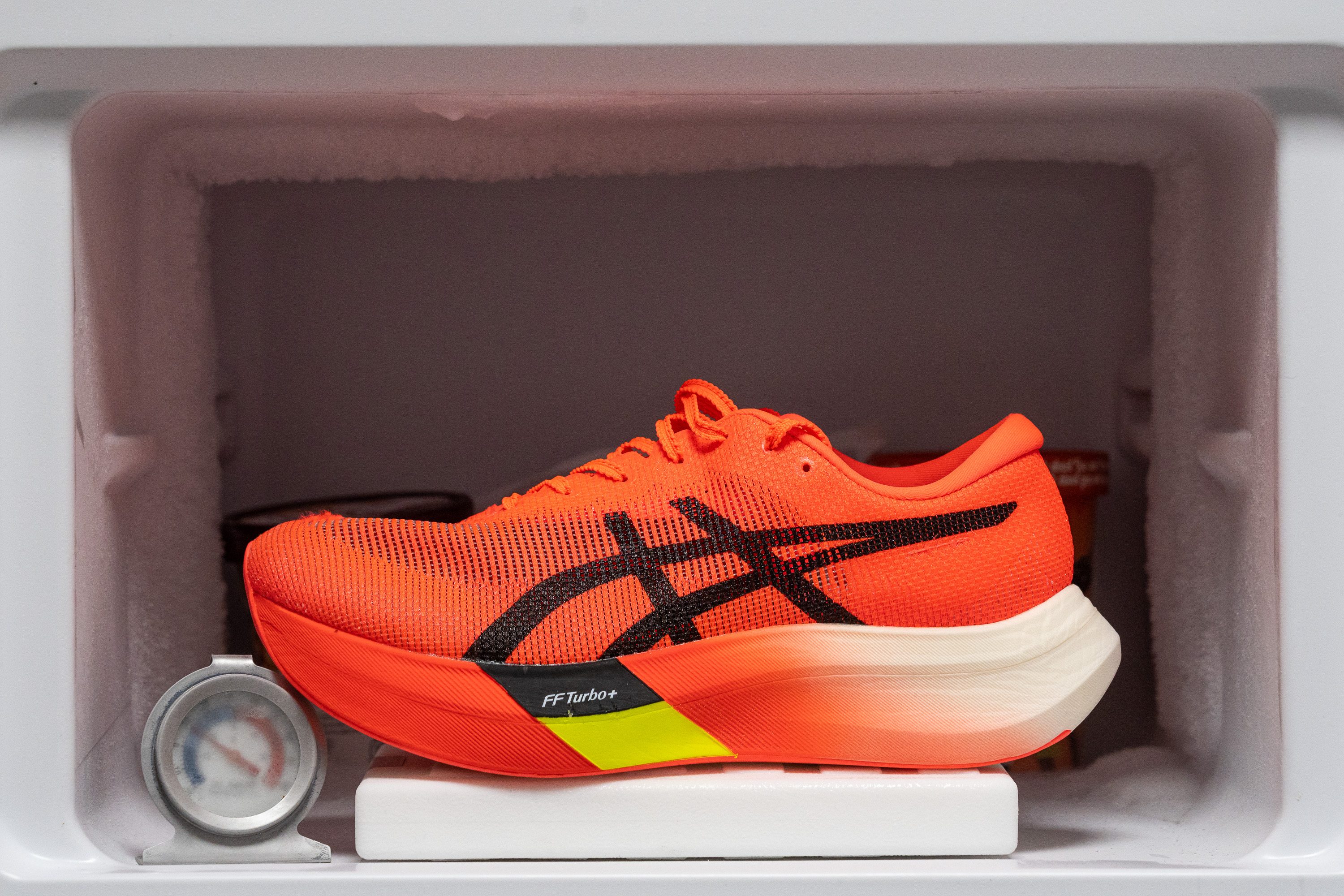
| Metaspeed Sky Paris | 6% |
| Average | 24% |
Reflective elements
The Metaspeed Sky Paris is designed predominantly for road races, which typically occur during the day. That explains the absence of reflective elements on the shoe despite its high price tag.
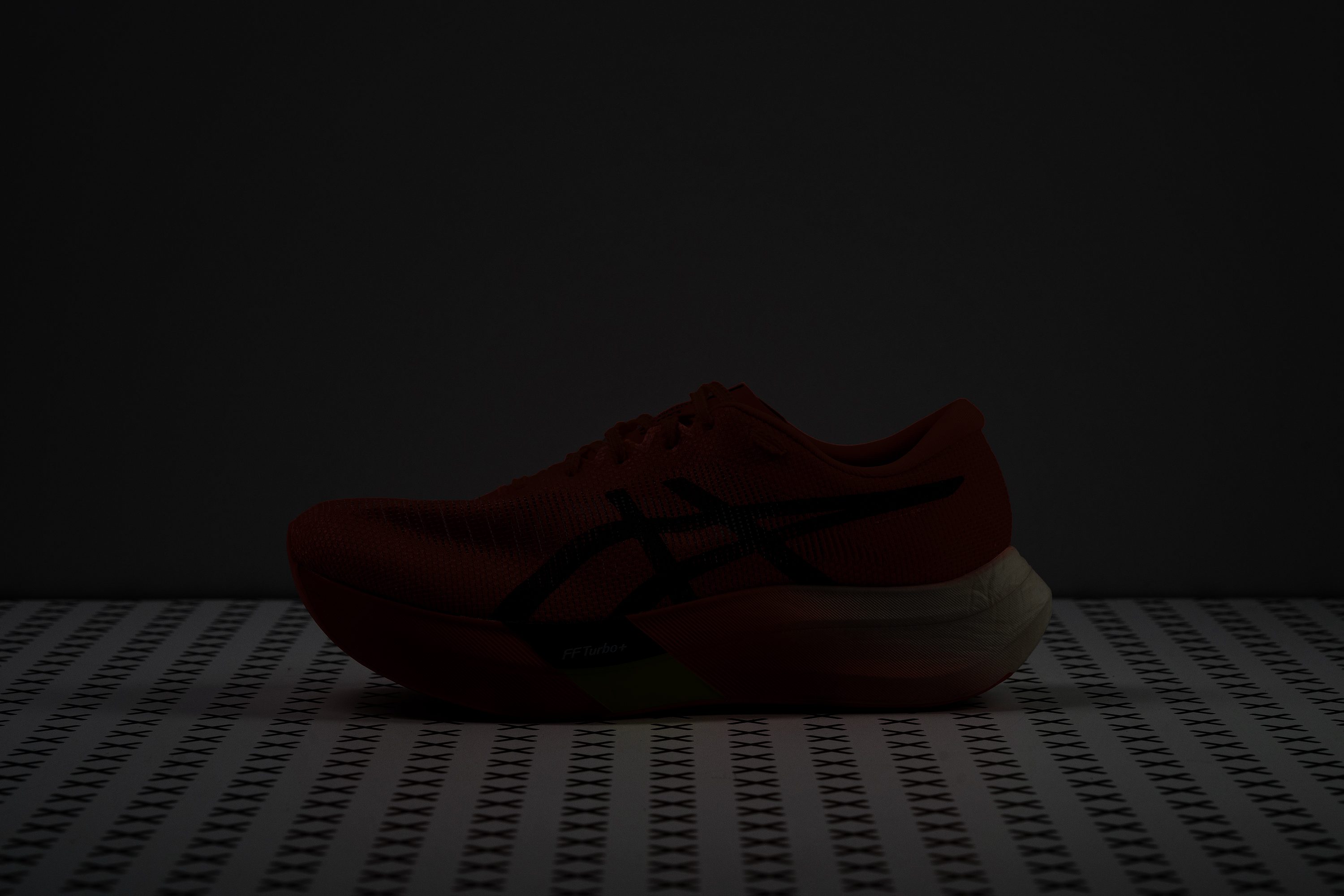
| Metaspeed Sky Paris | No |
Tongue padding
Creating one of the lightest super shoes ever doesn't happen by accident—it's achieved by strategically reducing weight in every component, including the tongue. And we found that ASICS really went the extra mile here.
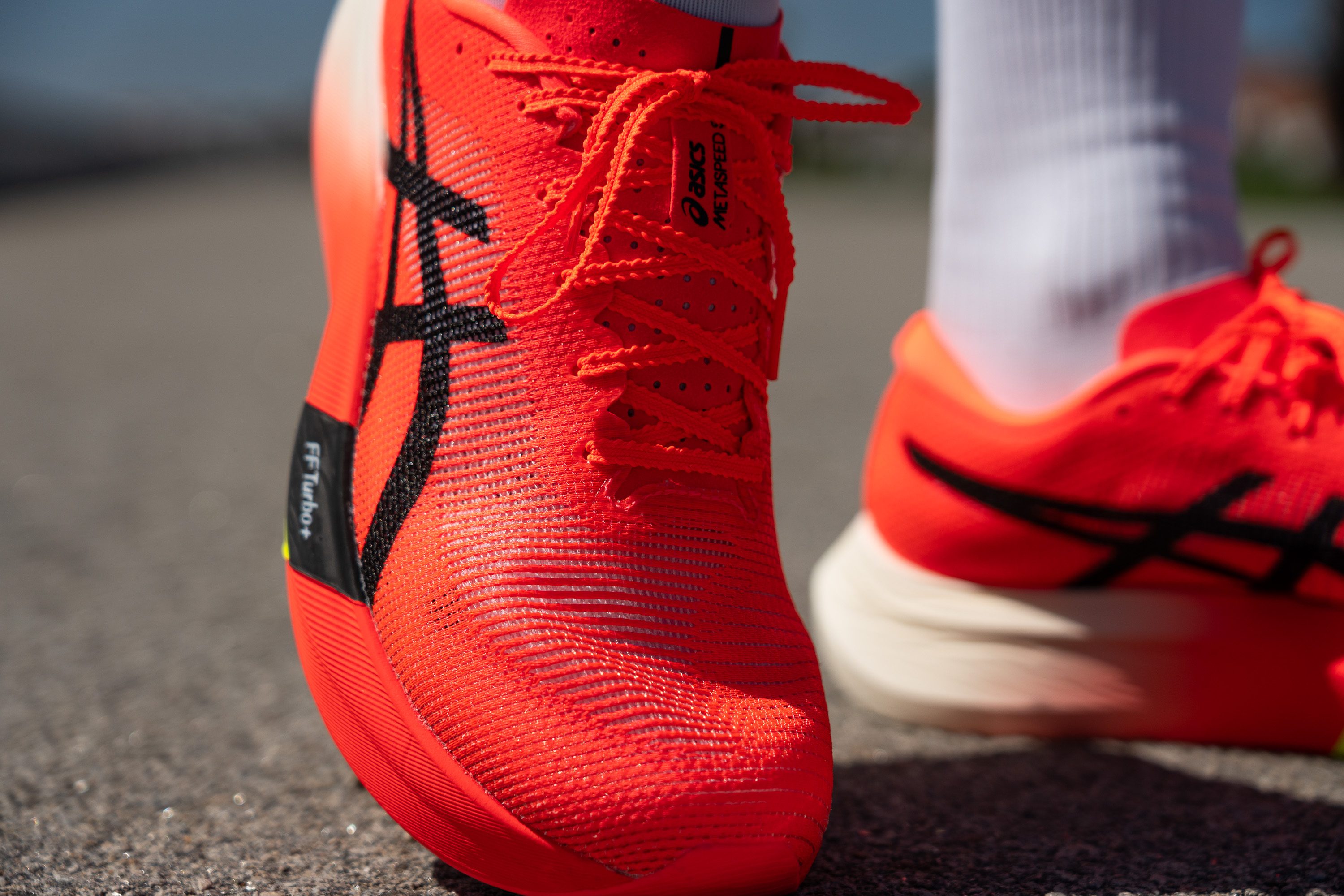
We discovered that the tongue is exceptionally thin, measuring just 1.0 mm, which is remarkably minimal. This could be a concern for runners who experience discomfort in the instep during longer races like half marathons or marathons. If you're one of those runners, consider the PUMA Deviate Nitro Elite 2 instead.
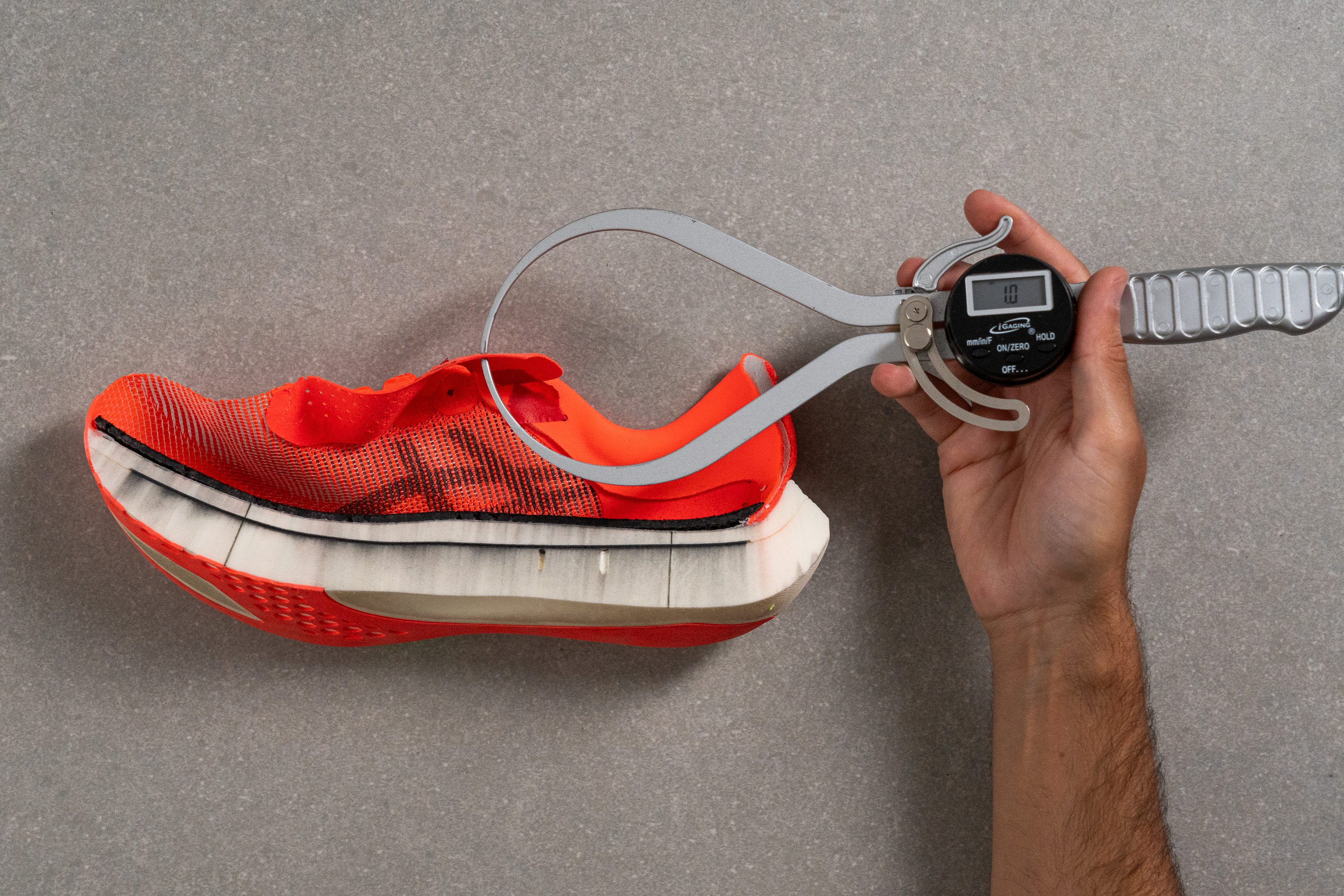
| Metaspeed Sky Paris | 1.0 mm |
| Average | 5.7 mm |
Tongue: gusset type
The tongue is not fixed to the sides, but this wasn't an issue during runs because the snug fit prevents the tongue from shifting around. And wow, check out all those perforations!
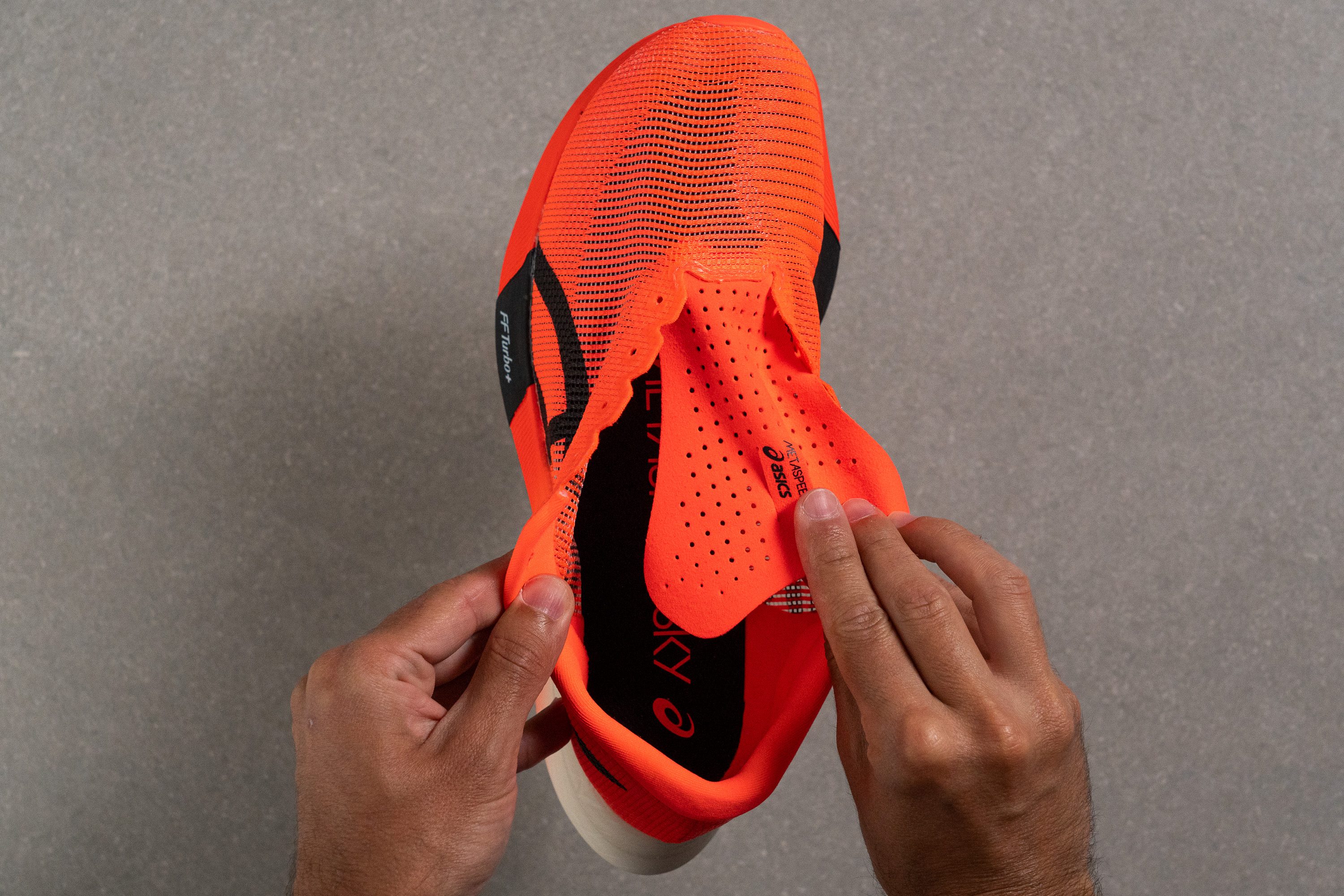
| Metaspeed Sky Paris | None |
Heel tab
ASICS barely modified the heel design from the Metaspeed Sky+ slightly to cut weight and enhance comfort. Consequently, there's no finger-loop heel tab!
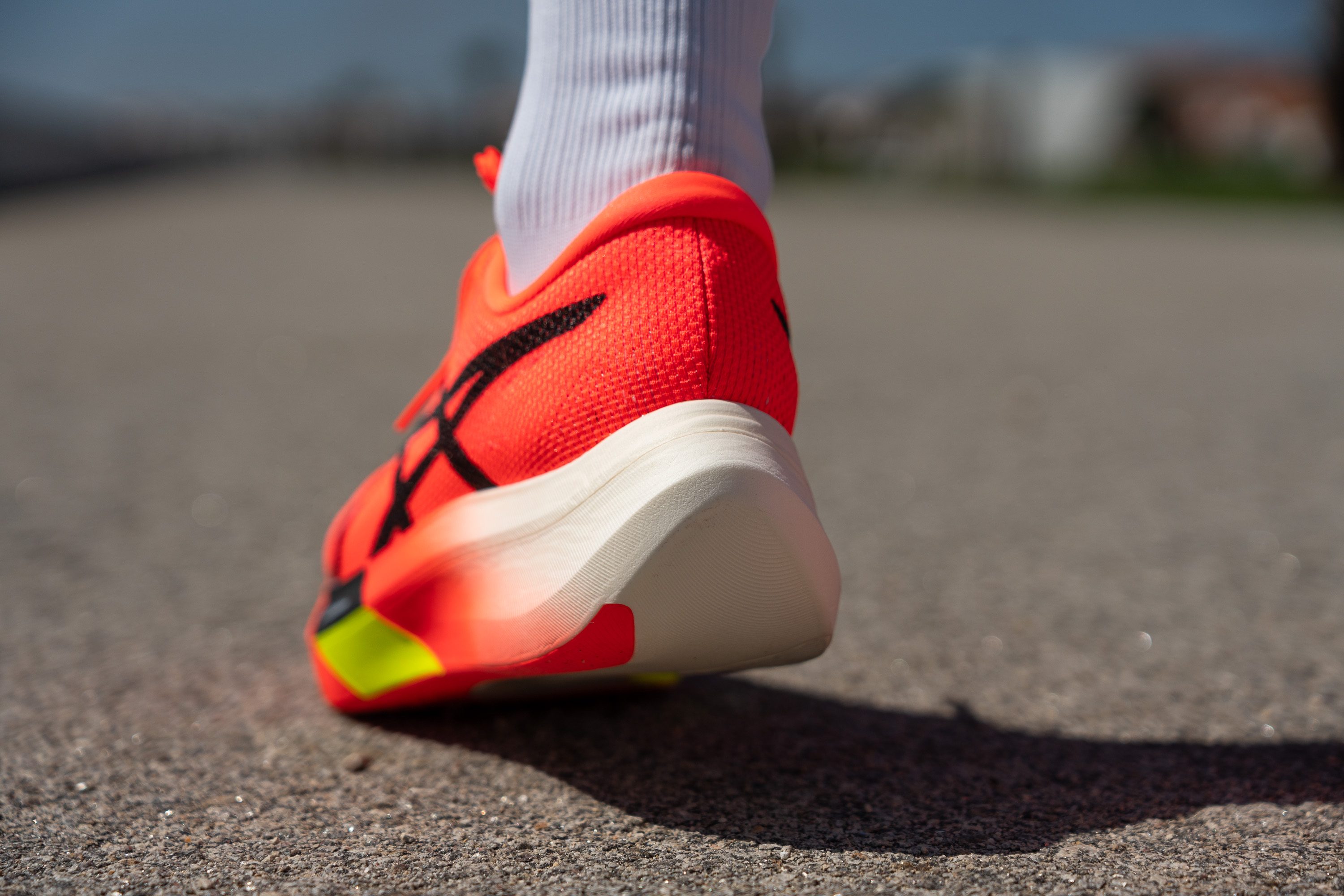
| Metaspeed Sky Paris | None |

